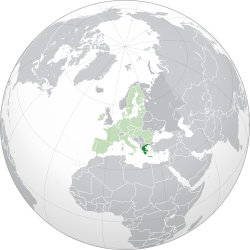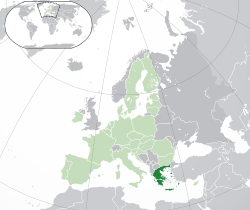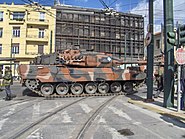Greece
This article may be too long to read and navigate comfortably. (June 2023) |
Hellenic Republic | |
|---|---|
| Motto: Ελευθερία ή Θάνατος Elefthería í Thánatos (English: "Freedom or Death") | |
| Anthem: Ύμνος εις την Ελευθερίαν Ímnos is tin Eleftherían (English: "Hymn to Liberty") | |
Location of Greece (dark green) – in Europe (light green & dark grey) | |
| Capital and largest city | Athens 37°58′N 23°43′E / 37.967°N 23.717°E |
| Official language and national language | Greek |
| Religion (2017) |
|
| Demonym(s) |
|
| Government | Unitary parliamentary republic |
| Katerina Sakellaropoulou | |
| Kyriakos Mitsotakis | |
| Konstantinos Tasoulas | |
| Legislature | Hellenic Parliament |
| Establishment history | |
• Independence declared from the Ottoman Empire | 25 March 1821 (traditional starting date of the Greek War of Independence), 15 January 1822 (official declaration) |
| 3 February 1830 | |
| 24 July 1974 | |
| 11 June 1975 | |
| Area | |
• Total | 131,957 km2 (50,949 sq mi)[2] (95th) |
• Water (%) | 1.51 (2015)[3] |
| Population | |
• 2023 estimate | |
• 2021 census | |
• Density | 78.9/km2 (204.4/sq mi) (105th) |
| GDP (PPP) | 2024 estimate |
• Total | |
• Per capita | |
| GDP (nominal) | 2024 estimate |
• Total | |
• Per capita | |
| Gini (2023) | medium |
| HDI (2022) | very high (33rd) |
| Currency | Euro (€) (EUR) |
| Time zone | UTC+02:00 (EET) |
• Summer (DST) | UTC+03:00 (EEST) |
| Date format | dd.mm.yyyy (AD)b |
| Driving side | right |
| Calling code | +30 |
| ISO 3166 code | GR |
| Internet TLD | |
| |
Greece,
Greece is considered the cradle of
Following a protracted
Greece is a
Name
The native name of the country in Modern Greek is Ελλάδα (ⓘ, pronounced [eˈlaða]). The corresponding form in Ancient Greek and conservative formal Modern Greek (Katharevousa) is Ἑλλάς (Hellas, classical: [hel.lás], modern: [eˈlas]). This is the source of the English alternative name Hellas, which is mostly found in archaic or poetic contexts today. The Greek adjectival form ελληνικός (ellinikos, [eliniˈkos]) is sometimes also translated as Hellenic and is often rendered in this way in the formal names of Greek institutions, as in the official name of the Greek state, the Hellenic Republic (Ελληνική Δημοκρατία, [eliniˈci ðimokraˈti.a]).[12]
The English names Greece and Greek are derived, via the Latin Graecia and Graecus, from the name of the Graeci (Γραικοί, Graikoí; singular Γραικός, Graikós), who were among the first ancient Greek tribes to settle Magna Graecia in southern Italy. The term is possibly derived from the Proto-Indo-European root *ǵerh₂-, "to grow old",[13][14] more specifically from Graea (ancient city), said by Aristotle to be the oldest in Greece, and the source of colonists for the Naples area.[15]
History
Prehistory and Aegean civilizations
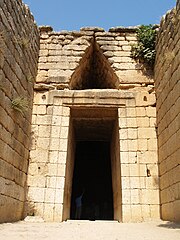
The
Greece is home to the first advanced civilizations in Europe and considered the birthplace of Western civilisation,[21][22] beginning with the Cycladic culture on the islands of the Aegean Sea around 3200 BC,[23] the Minoan civilization in Crete (2700–1500 BC),[24][25] and then the Mycenaean civilization on the mainland (1600–1100 BC).[25] These civilizations possessed writing, the Minoans using an undeciphered script known as Linear A, and the Mycenaeans writing the earliest attested form of Greek in Linear B.[26] Contemporary Hittite and Egyptian records suggest the presence of a single state under a "Great King" based in mainland Greece.[27][28]
Ancient Greece
The collapse of the Mycenean civilization ushered in the

By 500 BC, the Persian Empire controlled the Greek city states in Asia Minor and Macedonia.[35] Attempts by Greek city-states of Asia Minor to overthrow Persian rule failed, and Persia invaded the states of mainland Greece in 492 BC, but was forced to withdraw after defeat at the Battle of Marathon in 490 BC. In response, the Greek city-states formed the Hellenic League in 481 BC, led by Sparta, which was the first recorded union of Greek states since the mythical union of the Trojan War.[36][37] The second Persian invasion of Greece was decisively defeated in 480-79 BC, at Salamis and Plataea, marking the eventual withdrawal of the Persians from all their European territories. The Greek victories in the Greco-Persian Wars are a pivotal moment in history,[38] as the 50 years of peace afterwards are known as the Golden Age of Athens, a seminal period that laid many foundations of Western civilization.
Lack of political unity resulted in frequent conflict between Greek states. The most devastating intra-Greek war was the
After Philip's assassination in 336 BC, his son and
Roman province (146 BC – 4th century AD)

From about 200 BC the Roman Republic became increasingly involved in Greek affairs and engaged in a series of wars with Macedon.[46] Macedon's defeat at the Battle of Pydna in 168 BC signalled the end of Antigonid power.[47] In 146 BC, Macedonia was annexed as a province by Rome, and the rest of Greece became a Roman protectorate.[46][48]
The process was completed in 27 BC when emperor
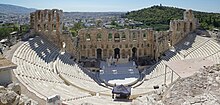
Greek-speaking communities of the Hellenised East were instrumental in the spread of Christianity in the 2nd and 3rd centuries,[52] and Christianity's early leaders and writers were mostly Greek-speaking, though not from Greece itself.[53] The New Testament was written in Greek, and some sections attest to the importance of churches in Greece in early Christianity. Nevertheless, much of Greece clung to paganism, and ancient Greek religious practices were still in vogue in the late 4th century AD,[54] when they were outlawed by the Roman emperor Theodosius I in 391–392.[55] The last recorded Olympic games were held in 393,[56] and many temples were destroyed or damaged in the century that followed.[57][58] The closure of the Neoplatonic Academy of Athens by Emperor Justinian in 529 is considered the end of antiquity, although there is evidence that the academy continued.[57][59]
Medieval period (4th–15th century)

The Roman Empire in the east, following the fall of the Western Roman Empire in the 5th century, is known as the Byzantine Empire (but called "Kingdom of the Romans" in its own time) and lasted until 1453. With its capital in Constantinople, its language and culture were Greek and its religion was predominantly Eastern Orthodox Christian.[60]
The Empire's Balkan territories, including Greece, suffered from the dislocation of barbarian invasions;[61] raids by Goths and Huns in the 4th and 5th centuries and the Slavic invasion in the 7th century resulted in a collapse in imperial authority in the Greek peninsula.[62] The imperial government retained control of only the islands and coastal areas, particularly the populated walled cities such as Athens, Corinth and Thessalonica.[62] [63][64] However, the view that Greece underwent decline, fragmentation and depopulation is considered outdated, as cities show institutional continuity and prosperity between the 4th and 6th centuries. In the early 6th century, Greece had approximately 80 cities according to the Synecdemus chronicle, and the 4th to the 7th century is considered one of high prosperity.[65]

Until the 8th century almost all of modern Greece was under the jurisdiction of the
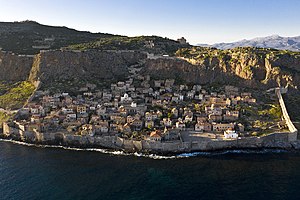
Following the Fourth Crusade and fall of Constantinople to the "Latins" in 1204, mainland Greece was split between the Greek Despotate of Epirus and French rule[70] (the Frankokratia).[71] The re-establishment of the imperial capital in Constantinople in 1261 was accompanied by the empire's recovery of much of the Greek peninsula, while the islands remained under Genoese and Venetian control.[70] During the Paleologi dynasty (1261–1453) a new era of Greek patriotism emerged accompanied by a turning back to ancient Greece.[72][73][74][75][76]
In the 14th century much of the Greek peninsula was lost by the Byzantine Empire to the Serbs and then the Ottomans.[77] Constantinople fell to the Ottomans in 1453 and by 1460, Ottoman conquest of mainland Greece was complete.[78] Byzantine Greek scholars, who up until then were largely responsible for preserving Classical Greek knowledge, fled to the West, taking with them literature and significantly contributing to the Renaissance.[79]
Venetian possessions and Ottoman rule (15th century – 1821)

While most of mainland Greece and the Aegean islands was under Ottoman control by the end of the 15th century, Cyprus and Crete remained Venetian and did not fall to the Ottomans until 1571 and 1670 respectively.[81] While some Greeks in the Ionian Islands and Constantinople lived in prosperity, and Greeks of Constantinople (Phanariots) achieved power within the Ottoman administration,[82] much of Greece suffered the economic consequences of Ottoman conquest. Heavy taxes were enforced, and in later years the Ottoman Empire enacted a policy of creation of hereditary estates, effectively turning the rural Greek populations into serfs.[83]
The Greek Orthodox Church and the Ecumenical Patriarchate of Constantinople were considered by the Ottoman governments as the ruling authorities of the entire Orthodox Christian population of the Ottoman Empire, whether ethnically Greek or not. Although the Ottoman state did not force non-Muslims to convert to Islam, Christians faced discrimination intended to highlight their inferior status. Discrimination, particularly when combined with harsh treatment by local Ottoman authorities, led to conversions to Islam, if only superficially. In the 19th century, many "crypto-Christians" returned to their old religious allegiance.[84]

The nature of Ottoman administration of Greece varied, though it was invariably arbitrary and often harsh.
The 16th and 17th centuries are regarded as a "dark age" in Greek history, with the prospect of overthrowing Ottoman rule appearing remote, with only the Ionian islands remaining free. However, in the 18th century, due to mastery of shipping and commerce, a wealthy and dispersed Greek merchant class arose. These merchants came to dominate trade within the Ottoman Empire, establishing communities throughout the Mediterranean, the Balkans, and Western Europe. Though the Ottoman conquest had cut Greece off from significant European intellectual movements such as the Reformation and the Enlightenment, these ideas together with the ideals of the French Revolution and romantic nationalism began to penetrate the Greek world via the mercantile diaspora.[88] In the late 18th century, Rigas Feraios, the first revolutionary to envision an independent Greek state, published documents on Greek independence, in Vienna.[89][90]
Modern nation-state
Greek War of Independence (1821–1832)
In the 18th century, an increase in learning during the
The first revolt began on 6 March 1821 in the
Kingdom of Greece

In 1827,
Despite the
Otto

Greeks were united, however, in their determination to liberate the
Expansion, disaster, and reconstruction
Amidst dissatisfaction with the seeming inertia and unattainability of

After the war, Greece attempted expansion into
Following the catastrophic events in Asia Minor, the monarchy was abolished
Dictatorship, World War II, and reconstruction
An agreement between Prime Minister Ioannis Metaxas and George II followed in 1936, which installed Metaxas as head of a dictatorship known as the 4th of August Regime, inaugurating authoritarian rule that would last until 1974.[126] Although a dictatorship, Greece remained on good terms with Britain and was not allied with the Axis.
In October 1940,
Following liberation, Greece annexed the
Although post-war was characterised by social strife and marginalisation of the left, Greece experienced rapid economic growth and recovery, propelled in part by the U.S. Marshall Plan.[133] In 1952, Greece joined NATO, reinforcing its membership in the Western Bloc of the Cold War.[134]
Third Hellenic Republic
The former prime minister
Meanwhile,
The country adopted the euro in 2001 and successfully hosted the
In 2019, Kyriakos Mitsotakis became Greece's new prime minister, after his centre-right New Democracy won the election.[144] In 2020, Greece's parliament elected a non-partisan candidate, Katerina Sakellaropoulou, as the first female President of Greece.[145] In February 2024, Greece became the first Orthodox Christian country to recognise same-sex marriage and adoption by same-sex couples.[146]
Geography

Located in Southern[147] and Southeast Europe,[148] Greece consists of a mountainous, peninsular mainland jutting out into the sea at the southern end of the Balkans, ending at the Peloponnese peninsula (separated from the mainland by the canal of the Isthmus of Corinth) and strategically located at the crossroads of Europe, Asia, and Africa.[d] Due to its highly indented coastline and numerous islands, Greece has the 11th longest coastline in the world with 13,676 km (8,498 mi);[154] its land boundary is 1,160 km (721 mi). The country lies approximately between latitudes 34° and 42° N, and longitudes 19° and 30° E, with the extreme points being:[155]
- North: Ormenio village
- South: Gavdos island
- East: Strongyli (Kastelorizo, Megisti) island
- West: Othonoi island
Eighty percent of Greece consists of mountains or hills, making the country one of the most mountainous in Europe. Mount Olympus, the mythical abode of the Greek Gods, culminates at Mytikas peak 2,918 metres (9,573 ft),[156] the highest in the country. Western Greece contains a number of lakes and wetlands and is dominated by the Pindus mountain range. The Pindus, a continuation of the Dinaric Alps, reaches a maximum elevation of 2,637 m (8,652 ft) at Mt. Smolikas (the second-highest in Greece) and historically has been a significant barrier to east–west travel.
The Pindus range continues through the central Peloponnese, crosses the islands of
Northeastern Greece features another high-altitude mountain range, the
Extensive plains are primarily located in the regions of Thessaly, Central Macedonia and Thrace. They constitute key economic regions as they are among the few arable places in the country. Rare marine species such as the pinniped seals and the loggerhead sea turtle live in the seas surrounding mainland Greece, while its dense forests are home to the endangered brown bear, the Eurasian lynx, the roe deer and the wild goat.
Islands

Greece features a vast number of islands—between 1,200 and 6,000, depending on the definition,[159] 227 of which are inhabited—and is considered a non-contiguous transcontinental country. Crete is the largest and most populous island; Euboea, separated from the mainland by the 60 m-wide Euripus Strait, is the second largest, followed by Lesbos and Rhodes.
The Greek islands are traditionally grouped into the following clusters: the
Climate
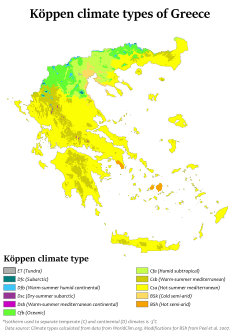
The
The mountainous areas and the higher elevations of northwestern Greece (parts of
Biodiversity
Politics


Greece is a
was guaranteed with an amendment to the 1952 Constitution.The nominal head of state is the
Legislative powers are exercised by a 300-member elective unicameral Parliament.[167] Statutes passed by the Parliament are promulgated by the President of the Republic.[167] Parliamentary elections are held every four years, but the President of the Republic is obliged to dissolve the Parliament earlier on the proposal of the Cabinet, in view of dealing with a national issue of exceptional importance.[167] The President is also obliged to dissolve the Parliament earlier if the opposition manages to pass a motion of no confidence.[167] The voting age is 17.[171]
According to a 2016 report by the OECD, Greeks display a moderate level of civic participation compared to most other developed countries; voter turnout was 64 percent during recent elections, lower than the OECD average of 69 percent.[172]
Political parties
Since the restoration of democracy in 1974-5, the Greek party system was dominated by the liberal-conservative New Democracy (ND) and the social-democratic Panhellenic Socialist Movement (PASOK).[e] PASOK and New Democracy largely alternated in power until the outbreak of the government-debt crisis in 2009, whenceforth they experienced a sharp decline in popularity.[174][175][176][177][178]
In the
SYRIZA has since overtaken PASOK as the main party of the centre-left.
Foreign relations

embassy
embassy in another country
general consulate
no representation
Greece
Greece's foreign policy is conducted through the
Following the resolution of the
There is a long-standing conflict between Turkey and Greece over natural resources in the eastern Mediterranean. Turkey does not recognize a legal continental shelf and exclusive economic zone around the Greek islands.[196]
Additionally, due to its political and geographical proximity to Europe, Asia, the Middle East and Africa, Greece is a country of significant geostrategic importance, which it has leveraged to develop a regional policy to help promote peace and stability in the
Greece is a member of numerous international organizations, including the
Military
The Hellenic Armed Forces are overseen by the
- Hellenic Army (Ellinikos Stratos, ES)
- Hellenic Navy (Elliniko Polemiko Navtiko, EPN)
- Hellenic Air Force (Elliniki Polemiki Aeroporia, EPA)
Moreover, Greece maintains the
Greek military personnel total 364,050, of whom 142,700 are active and 221,350 are reserve. Greece ranks 28th in the world in the number of citizens serving in the armed forces. Mandatory military service is generally one year for 19 to 45 year olds.[200] Additionally, Greek males between the ages of 18 and 60 who live in strategically sensitive areas may be required to serve part-time in the National Guard.
As a member of
Law and justice
The judiciary is independent of the executive and the legislature and comprises three Supreme Courts: the Supreme Civil and Criminal Court of Greece, the Council of State and the Court of Audit. The judicial system is also composed of civil courts, which judge civil and penal cases and administrative courts, which judge disputes between citizens and the Greek administrative authorities.
The Hellenic Police is the national police force. It is a large agency with its responsibilities ranging from
Administrative divisions
Since the
| Map | No. | Region |
Capital | Area (km2) | Area (sq mi) | Population[205] | GDP ( bn)[206]
|
|---|---|---|---|---|---|---|---|
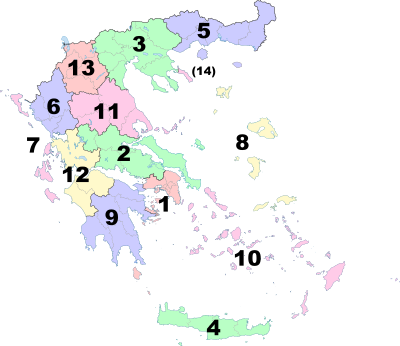 |
1 | Attica | Athens | 3,808 | 1,470 | 3,814,064 | €84 |
| 2 | Central Greece | Lamia | 15,549 | 6,004 | 508,254 | €8 | |
| 3 | Central Macedonia | Thessaloniki | 18,811 | 7,263 | 1,795,669 | €24 | |
| 4 | Crete | Heraklion | 8,259 | 3,189 | 624,408 | €9 | |
| 5 | East Macedonia and Thrace |
Komotini | 14,158 | 5,466 | 562,201 | €7 | |
| 6 | Epirus | Ioannina | 9,203 | 3,553 | 319,991 | €4 | |
| 7 | Ionian Islands | Corfu | 2,307 | 891 | 204,532 | €3 | |
| 8 | North Aegean | Mytilene | 3,835.91 | 1,481 | 194,943 | €2 | |
| 9 | Peloponnese | Tripoli | 15,490 | 5,981 | 539,535 | €8 | |
| 10 | South Aegean | Ermoupoli | 5,286 | 2,041 | 327,820 | €6 | |
| 11 | Thessaly | Larissa | 14,034 | 5,420 | 688,255 | €9 | |
| 12 | West Greece |
Patras | 11,350 | 4,382 | 648,220 | €8 | |
| 13 | West Macedonia |
Kozani | 9,451 | 3,649 | 254,595 | €4 | |
| (14) | Mount Athos | Karyes |
390 | 151 | 1,746 | — |
Economy
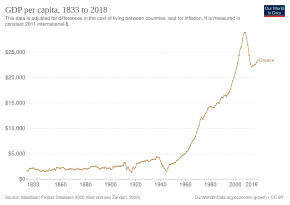

As of 2023[update], the economy was the
Greece is a
Greece has the largest economy in the Balkans,[223][224][225] and an important regional investor.[223][224] It has been the number-two foreign investor of capital in Albania and most important trading partner and largest foreign investor of North Macedonia.[226][227] The Greek telecommunications company OTE has become a strong investor in other Balkan countries.[228]
Greece was a founding member of the
Debt crisis (2010–2018)

Leading up to the 2007–2008 financial crisis, Greece had high structural deficits.[230] In 2009, it was revealed deficits had been considerably higher than official figures.[231] Banks had supplied cash in exchange for future payments by various governments; in turn the liabilities of the countries were "kept off the books", hiding borrowing levels.[232][233][234] This enabled Greece to spend beyond its means, while technically meeting the deficit target in the Maastricht Treaty.[235][236]
The crisis was triggered by the Great Recession, which caused Greece's GDP to contract 2.5% in 2009.[237] Simultaneously, deficits were revealed to have been allowed to reach 10% and 15% in 2008 and 2009. This caused Greece's debt-to-GDP ratio to increase to 127%.[238] As a eurozone member, Greece had no autonomous monetary policy flexibility, it could not change interest rates or let its exchange rate absorb the shock. Greece's borrowing rates increased, causing a crisis of confidence in Greece's ability to pay back loans in early 2010.[239][240]
To avert a sovereign default, Greece, other eurozone members, and the International Monetary Fund agreed on a €110 billion rescue package in May 2010.[241][242] Greece was required to adopt harsh austerity measures to bring its deficit down.[243] A second bail-out of €130 billion was agreed in 2012, subject to financial reforms and further austerity.[244] A debt haircut was agreed.[244] Greece achieved a budget surplus in 2013 and returned to growth in 2014.[245][246]
Partly due to the imposed austerity,[231] Greece experienced a 25% drop in GDP between 2009-15.[247] The debt ratio, jumped from 127% to about 170%, due to the shrinking economy.[248] In 2013, the IMF admitted it had underestimated the effects of tax hikes and budget cuts and issued an informal apology.[249][250][251] The policies have been blamed for worsening the crisis,[252][253] while others stressed the creditors' share in responsibility.[254][255][248] The bailouts ended in 2018.[142]
In 2024, the Greek economy is forecast to grow nearly 3%, meaning it approaches its pre-crisis size of 2009 and far outpacing the euro zone average economic growth of 0.8%.[256]
Agriculture
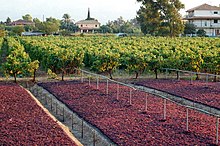
Greece is the European Union's largest producer of
Greece is a major beneficiary of the EU's Common Agricultural Policy. As a result of entry to the European Community, much of its agricultural infrastructure has been upgraded and output increased.
Energy
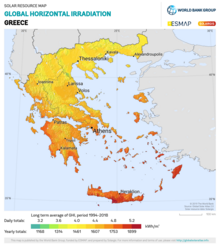
Electricity production is dominated by the state-owned Public Power Corporation (known by its acronym ΔΕΗ, transliterated as DEI), which supplied 75% of electricity in 2021.[260] Some of DEI's output is generated using lignite.[261] Renewable energy in Greece accounted for 46% of Greece's electricity in 2022,[262] a rise from the 11% in 2011.[263] 22% comes from wind power, 14% solar power, 9% hydropower and 38% natural gas.[264] Independent companies' energy production has increased. Greece does not have any nuclear power plants.
Maritime
The shipping industry has been a key element of economic activity since ancient times.[266] Shipping remains one of the country's most important industries, accounting for 5% of GDP and employing about 160,000 people (4% of the workforce).[267]
The
Greece has a significant shipbuilding and ship maintenance industry. The six shipyards around the port of Piraeus are among the largest in Europe.[270] Greece has become a leader in the construction and maintenance of luxury yachts.[271]
Tourism

Tourism has been a key element of the economy and one of the most important sectors, contributing 21% of gross domestic product in 2018.[274] Greece was the 9th most visited country in the world in 2022, hosting 28 million visitors,[11] an increase from 18 million tourists in 2007.[275]
Most visitors come from the European continent,
In 2011,
Transport
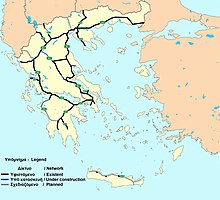
Since the 1980s, the road and rail network has been modernised. With a total length of about 2320 km as of 2020, Greece's motorway network is the most extensive in
Also completed are the
The Athens Metropolitan Area in particular is served by some of the most modern and efficient transport infrastructure in Europe, such as the Athens International Airport, the privately run A6 (Attiki Odos) motorway network and the expanded Athens Metro system. Most Greek islands and main cities are connected by air, by the two major airlines, Olympic Air and Aegean Airlines.
Railway connections play a lesser role than in many other European countries, but have been expanded, with new suburban/commuter rail connections, serviced by Proastiakos around Athens, towards its airport, Kiato and Chalkida; around Thessaloniki, towards the cities of Larissa and Edessa; and around Patras. A modern intercity rail connection between Athens and Thessaloniki has been established, while an upgrade to double lines in many parts of the 2,500 km (1,600 mi) network is underway; along with a new double track, standard gauge railway between Athens and Patras (replacing the old metre-gauge Piraeus–Patras railway) which is under construction and opening in stages.[282] International railway lines connect Greek cities with the rest of Europe, the Balkans and Turkey.
Given Greece's long coastline and number of islands, maritime transport is particularly important. All major islands are served by ferries to the mainland.
Greece has 39 active airports, 15 of which serve international destinations.[284] Athens International Airport served over 28 million passengers in 2023.[285] Most major islands are served by airports, with direct connections to other airports in Europe.
Telecommunications
Modern digital information and communication networks reach all areas. There are over 35,000 km (21,748 mi) of fiber optics and an extensive open-wire network. Broadband internet availability is widespread in Greece: there were a total of 2,252,653 broadband connections as of early 2011[update], translating to 20% broadband penetration.[286] In 2017 around 82% of the population used the internet regularly.[287]
Internet cafés that provide net access, office applications and multiplayer gaming are a common sight, while mobile internet on 3G and 4G- LTE cellphone networks and Wi-Fi connections can be found almost everywhere.[288] As of July 2022, 5G service is accessible in most of major cities. The UN ranks Greece among the top 30 countries with a highly developed information and communications infrastructure.[289]
Science and technology


The General Secretariat for Research and Technology of the Ministry of Development and Competitiveness is responsible for designing, implementing and supervising national research and technological policy. In 2017, spending on research and development (R&D) reached an all-time high of €2 billion, equal to 1.1% of GDP.[290]
Greece was ranked 42nd in the Global Innovation Index in 2023.[291]
Greece has major technology parks with incubator facilities and been a member of the
Greece has one of the highest rates of tertiary enrollment in the world,
Notable Greek scientists of modern times include Georgios Papanikolaou (inventor of the Pap test), mathematician Constantin Carathéodory (known for the Carathéodory theorems and Carathéodory conjecture), astronomer E. M. Antoniadi, archaeologists Ioannis Svoronos, Valerios Stais, Spyridon Marinatos, Manolis Andronikos (discovered the tomb of Philip II of Macedon in Vergina), Indologist Dimitrios Galanos, botanist Theodoros G. Orphanides, and scientists such as Michael Dertouzos, Nicholas Negroponte, John Argyris, John Iliopoulos (2007 Dirac Prize for his contributions on the physics of the charm quark), Joseph Sifakis (2007 Turing Award, the "Nobel Prize" of Computer Science), Christos Papadimitriou (2002 Knuth Prize, 2012 Gödel Prize), Mihalis Yannakakis (2005 Knuth Prize) and physicist Dimitri Nanopoulos.
Demographics
Eurostat estimated the population at 10.6 million in 2022.[297]

Greek society has changed over recent decades, coinciding with the
The
As a result of these trends, the average household is smaller and older than in previous generations. The economic crisis exacerbated this development, with 350,000–450,000 Greeks, predominantly young adults, emigrating since 2010.[302]
Cities
Almost two-thirds of the Greek people live in urban areas. Greece's largest and most influential metropolitan centres are
Rank
|
Name
|
Region
|
Pop.
|
Rank
|
Name
|
Region
|
Pop. |
||
|---|---|---|---|---|---|---|---|---|---|
 Athens  Thessaloniki |
1 | Athens | Attica | 3,090,508 | 11 | Serres | Central Macedonia | 58,287 |  Patras  Piraeus |
| 2 | Thessaloniki | Central Macedonia | 824,676 | 12 | Alexandroupoli |
Eastern Macedonia and Thrace | 57,812 | ||
| 3 | Patras | Western Greece | 173,600[306] | 13 | Xanthi | Eastern Macedonia and Thrace | 56,122 | ||
| 4 | Piraeus | Attica | 168,151 | 14 | Katerini | Central Macedonia | 55,997 | ||
| 5 | Heraklion | Crete | 156,842[307] | 15 | Kalamata | Peloponnese | 54,100 | ||
| 6 | Larisa |
Thessaly | 148,562[308] | 16 | Kavala | Eastern Macedonia and Thrace | 54,027 | ||
| 7 | Volos | Thessaly | 85,803[309] | 17 | Chania | Crete | 53,910 | ||
| 8 | Ioannina | Epirus | 65,574 | 18 | Lamia | Central Greece | 52,006 | ||
| 9 | Trikala | Thessaly | 61,653 | 19 | Komotini | Eastern Macedonia and Thrace | 50,990 | ||
| 10 | Chalcis | Central Greece | 59,125 | 20 | Rhodes | South Aegean | 49,541 | ||
Religion
Religiosity in Greece (2017):[1]
The Greek Constitution recognises
In a 2010 Eurostat–Eurobarometer poll, 79% of Greek citizens responded that they "believe there is a God".[312] According to other sources, 16% of Greeks describe themselves as "very religious", which is the highest among all European countries. The survey found just 3.5% never attend a church, compared to 5% in Poland and 59% in the Czech Republic.[313]

Estimates of the recognised
Judaism has been present in Greece for more than 2,000 years. The ancient community of Greek Jews is called
The
Since 2017,
Languages

Greece is relatively homogeneous in linguistic terms, with a large majority of the native population using Greek as their first or only language. Among the Greek-speaking population, speakers of the distinctive
The Muslim minority in Thrace, approximately 0.95% of the population, consists of speakers of Turkish, Bulgarian (Pomaks)[332] and Romani. Romani is spoken by Christian Roma in other parts of the country. Further minority languages have traditionally been spoken by regional population groups in various areas. Their use decreased radically in the course of the 20th century through assimilation with the Greek-speaking majority. They are only maintained by the older generations and almost extinct. The same is true for the Arvanites, an Albanian-speaking group mostly located in rural areas around Athens, and for the Aromanians and Megleno-Romanians whose language is closely related to Romanian and who used to live scattered across areas of mountainous central Greece. Members of these groups usually identify ethnically as Greek[333] and are bilingual in Greek.
Near the northern Greek borders there are some
Migration

Throughout the 20th century, millions of Greeks migrated to the
A study from the Mediterranean Migration Observatory maintains that the 2001 census recorded 762,191 persons residing in Greece without Greek citizenship, constituting around 7% of the population. Of the non-citizen residents, 48,560 were EU or European Free Trade Association nationals and 17,426 were Cypriots with privileged status. The majority come from Eastern European countries: Albania (56%), Bulgaria (5%) and Romania (3%), while migrants from the former Soviet Union (Georgia, Russia, Ukraine, Moldova, etc.) comprise 10% of the total.[336] Some immigrants from Albania are from the Greek minority in Albania centred on the region of Northern Epirus. The total Albanian national population which includes temporary migrants and undocumented persons is around 600,000.[337]
The
The greatest cluster of non-EU immigrant population are in the larger urban centers, especially Athens, with 132,000 immigrants comprising 17% of the local population, and then Thessaloniki, with 27,000 immigrants reaching 7% of the local population. There is a considerable number of co-ethnics that came from the Greek communities of Albania and former Soviet Union.[335]
Greece, together with Italy and Spain, is a major entry point for
Education
This section needs to be updated. The reason given is: The description of the secondary, post-secondary and tertiary education does not reflect the current situation. (January 2024) |
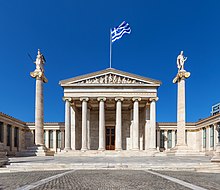
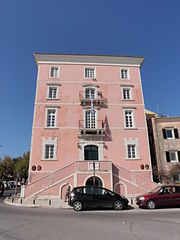
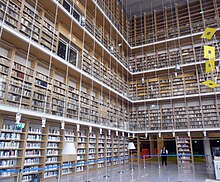
Greeks have a long tradition of valuing and investing in paideia (education), which was upheld as one of the highest societal values in the Greek and Hellenistic world. The first European institution described as a university was founded in fifth-century Constantinople and continued operating in various incarnations until the city's fall to the Ottomans in 1453.[343] The University of Constantinople was Christian Europe's first secular institution of higher learning,[344] and by some measures was the world's first university.[343]
Compulsory education in Greece comprises primary schools (Δημοτικό Σχολείο, Dimotikó Scholeio) and gymnasium (Γυμνάσιο). Nursery schools (Παιδικός σταθμός, Paidikós Stathmós) are popular but not compulsory. Kindergartens (Νηπιαγωγείο, Nipiagogeío) are compulsory for any child above four. Children start primary school aged six and remain there for six years. Attendance at gymnasia starts aged 12 and lasts for three years.
Greece's post-compulsory secondary education consists of two school types: unified upper secondary schools (Γενικό Λύκειο, Genikό Lykeiό) and
According to the Framework Law (3549/2007), Public higher education "Highest Educational Institutions" (Ανώτατα Εκπαιδευτικά Ιδρύματα, Anótata Ekpaideytiká Idrýmata, "ΑΕΙ") consists of two parallel sectors:the university sector (Universities, Polytechnics, Fine Arts Schools, the Open University) and the Technological sector (Technological Education Institutions (TEI) and the School of Pedagogic and Technological Education). There are State Non-University Tertiary Institutes offering vocationally oriented courses of shorter duration (2-3 years) which operate under the authority of other Ministries. Students are admitted to these Institutes according to their performance at national level examinations taking place after completion of the third grade of Lykeio. Students over 22 may be admitted to the Hellenic Open University through a lottery.
The education system provides special kindergartens, primary, and secondary schools for people with special needs or difficulties in learning. There are specialist gymnasia and high schools offering musical, theological, and physical education.
72% of adults aged 25–64 have completed upper secondary education, which is slightly less than the OECD average of 74%. The average Greek pupil scored 458 in reading literacy, maths and science in the OECD's 2015 Programme for International Student Assessment (PISA). This is lower than the OECD average of 486. Girls outperformed boys by 15 points, much more than the average OECD gap of 2.[345]
Healthcare system
Greece has
Greece's healthcare expenditures was 9.6% of GDP in 2007. By 2015, it declined to 8.4%, compared with the EU average of 9.5%. Nevertheless, the country maintains the highest doctor-to-population ratio of any OECD country[349] and the highest doctor-to-patient ratio in the EU.[350]
A 2011 OECD report showed Greece had the largest percentage of adult daily smokers of any of the 34 OECD members.[349] The obesity rate is 18%, above the OECD average of 15%.[349] In 2008, infant mortality, with a rate of 3.6 deaths per 1,000 live births, was below the 2007 OECD average of 4.9.[349]
Culture

The culture of Greece has evolved, beginning in
In ancient times, Greece was the birthplace of
Visual arts

Artistic production in Greece began in the prehistoric pre-Greek
There were interconnected traditions of painting in ancient Greece. Due to technical differences, they underwent differentiated developments. Not all painting techniques are equally well represented in the archaeological record. The most respected form of art, according to Pliny or Pausanias, were individual, mobile paintings on wooden boards, described as panel paintings. Wall painting in Greece goes back at least to the Minoan and Mycenaean Bronze Age, with the lavish fresco decoration of sites like Knossos, Tiryns and Mycenae. Much figural or architectural sculpture of ancient Greece was painted colourfully. This aspect of Greek stonework is described as polychrome.[360]
Art production continued during the Byzantine era. The most salient feature of this new aesthetic was its "abstract", or anti-naturalistic character. Classical art was marked by attempts to create representations that mimicked reality, Byzantine art favoured a more symbolic approach. Byzantine painting concentrated mainly on icons and hagiographies. The Macedonian art (Byzantine) was the artistic expression of Macedonian Renaissance, a label used to describe the Macedonian dynasty of the Byzantine Empire (867–1056), which scholars have seen as a time of increased interest in classical scholarship and the assimilation of classical motifs into Christian artwork.
Post Byzantine art schools include the
Architecture
The architecture of ancient Greece was produced by the ancient Greeks (Hellenes), whose
Byzantine architecture was dominant in the Greek speaking world and significantly influenced Medieval architecture throughout Europe and the Near East, becoming the primary progenitor of the Renaissance and Ottoman architectural traditions that followed the Byzantine Empire's collapse..
After Greek Independence, modern Greek architects combined traditional Greek and Byzantine elements and motives with the western European movements and styles. Patras was the first city of the modern Greek state to develop a city plan. In 1829, Stamatis Voulgaris, a Greek engineer of the French army, presented the plan of the new city to the Governor Kapodistrias, who approved it. Voulgaris applied the orthogonal rule in the urban complex of Patras.[362]
Two special genres can be considered the Cycladic architecture, featuring white-coloured houses, in the
After the establishment of the
There is an emerging need to secure the long-term preservation of the archaeological sites and monuments against the growing threats of climate change.[366]
Theatre
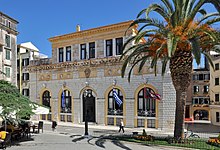
Theatre in its western form was born in Greece.[367] The city-state of Classical Athens, which became a significant cultural, political, and military power during this period, was its centre, where it was institutionalised as part of a festival called the Dionysia, which honoured the god Dionysus. Tragedy (late 6th century BC), comedy (486 BC), and the satyr play were the three dramatic genres to emerge there.
During the Byzantine period, theatrical art declined, the only form that survived was folk theatre (Mimos and Pantomimos), despite the hostility of the state.
Modern Greek theatre was born after independence, in the early 19th century, and initially was influenced by Heptanesean theatre and melodrama, such as the Italian opera. The
The
Literature

Greek literature can be divided into three main categories: Ancient, Byzantine and modern Greek.. The Classical era also saw the dawn of drama.
Of the hundreds of
Leading figures of modern Greek literature include
Philosophy
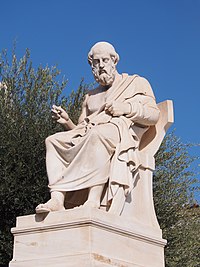
Most western philosophical traditions began in Ancient Greece in the 6th century BC. The first philosophers are called "Presocratics", which designates that they came before Socrates, whose contributions mark a turning point in western thought. The Presocratics were from the western or the eastern colonies of Greece and only fragments of their writings survive.
A new period of philosophy started with Socrates. Like the
In the modern period, Diafotismos (Greek: Διαφωτισμός, "enlightenment", "illumination")[374] was the Greek expression of the Age of Enlightenment and its philosophical and political ideas. Notable representatives were Adamantios Korais, Rigas Feraios and Theophilos Kairis. Other modern era Greek philosophers or political scientists include Cornelius Castoriadis, Nicos Poulantzas and Christos Yannaras.
Music and dances
This section needs additional citations for verification. (October 2017) |

Greek vocal music extends far back into ancient times where mixed-gender choruses performed for entertainment, celebration and spiritual reasons. Instruments included the double-reed aulos and the plucked string instrument, the lyre, especially the special kind called a kithara. Music played an important role in education during ancient times. Boys were taught music from the age of six. Later influences from the Roman Empire, Middle East, and the Byzantine Empire affected Greek music.
While the new technique of polyphony was developing in the West, the
Along with Byzantine chant and music, the Greeks cultivated the

The
It was through the
In the 20th century, Greek composers had significant impact on the development of
During the
Greece participated in the
Cuisine

Sweet desserts include
Cinema
Cinema first appeared in Greece in 1896, but the first cine-theatre was opened in 1907 in Athens. In 1914, the Asty Films Company was founded and the production of long films began. Golfo, a well known traditional love story, is considered the first Greek feature film, although there were minor productions such as newscasts before. In 1931, Orestis Laskos directed Daphnis and Chloe, containing one of the first nude scene in European cinema;[382] it was the first Greek movie played abroad.[383] In 1944, Katina Paxinou was honoured with the Best Supporting Actress Academy Award for For Whom the Bell Tolls.[384]
The 1950s and early 1960s are considered to be a "golden age" of Greek cinema.
Cacoyannis directed
During the 1970s and 1980s, Theo Angelopoulos directed notable movies. His film Eternity and a Day won the Palme d'Or and the Prize of the Ecumenical Jury at the 1998 Cannes Film Festival.[387][388][389]
There are internationally renowned filmmakers in the Greek diaspora, such as the Greek-French
Sports

This section may be too long to read and navigate comfortably. (April 2024) |
Greece is the birthplace of the ancient Olympic Games, first recorded in 776 BC in Olympia, and hosted the modern Olympic Games twice, the inaugural 1896 Summer Olympics and the 2004 Summer Olympics. During the parade of nations, Greece is always called first, as the founding nation of the ancient precursor of modern Olympics. The nation has competed at every Summer Olympic Games, one of only four countries to have done so. Having won a total of 110 medals (30 gold, 42 silver and 38 bronze), Greece is ranked 32nd by gold medals in the all-time Summer Olympic medal count. Their best ever performance was in the 1896 Summer Olympics, when Greece finished second in the medal table with 10 gold medals.
The
The
The
The
Public holidays and festivals

According to Greek law, every Sunday of the year is a public holiday. Since the late '70s, Saturday also is a non-school and not working day. In addition, there are four mandatory official public holidays: 25 March (
Notable festivals, beyond the religious fests, include
See also
Notes
- ^ Greek: Ελλάδα, romanized: Elláda, [eˈlaða] or Ελλάς, romanized: Ellás, [eˈlas]
- ^ Greek: Ελληνική Δημοκρατία, romanized: Ellinikí Dimokratía, [eliniˈci ðimokraˈti.a]
- ^ On 14 August 1974 Greek forces withdrew from the integrated military structure of NATO in protest at the Turkish occupation of northern Cyprus; Greece rejoined NATO in 1980.
- ^ See:[149][150][151][152][153]
- ^ For a diachronic analysis of the Greek party system,[173] who distinguishes three distinct types of party system which developed in consecutive order, namely, a predominant-party system (from 1952 to 1963), a system of polarised pluralism (between 1963 and 1981), and a two-party system (since 1981).
References
Citations
- ^ a b "Religious Belief and National Belonging in Central and Eastern Europe". Pew Research Center. 10 May 2017. Retrieved 9 September 2017.
- ^ "Country Comparison: Area". The World Factbook. Central Intelligence Agency. Archived from the original on 13 November 2020. Retrieved 7 January 2013.
- Organisation for Economic Co-operation and Development(OECD). Retrieved 11 October 2020.
- ^ a b "Estimated Population and Migration Flows, 2023". Piraeus: Hellenic Statistical Authority. 29 December 2023. Retrieved 8 January 2024.
- ^ Αποτελέσματα Απογραφής Πληθυσμού - Κατοικιών 2021 [Results of Population-Housing Census 2021] (in Greek). Piraeus: Hellenic Statistical Authority. 19 July 2022. Retrieved 8 January 2024.
- ^ a b c d "World Economic Outlook Database, April 2024". Washington, D.C.: International Monetary Fund. 16 April 2024. Retrieved 18 April 2024.
- ^ "Income inequality, 2023". Piraeus: Hellenic Statistical Authority. 3 April 2024. Retrieved 3 April 2024.
- ^ "Human Development Report 2023/24" (PDF). United Nations Development Programme. 13 March 2024. Retrieved 13 March 2024.
- ^ [1] The Constitution of Greece: Section II Relations of Church and State: Article 3, Hellenic Resources network.
- ISBN 9781135761417.
Both as a state church and as a national church, the Orthodox Church of Greece has a lot in common with Protestant state churches, and even with Catholicism in some countries.
- ^ a b "International Tourism – 2023 starts on a strong note with the Middle East recovering 2019 levels in the first quarter" (PDF). webunwto.s3.eu-west-1.amazonaws.com. Archived from the original (PDF) on 2 August 2023.
- ^ "Government and Politics". Ministry of Foreign Affairs. Archived from the original on 27 December 2019. Retrieved 28 April 2020.
- ^ Starostin, Sergei (1998). The Tower of Babel: An Etymological Database Project.
- ISBN 0618082506.
- MeteorologicaI.xiv
- S2CID 195873640.
- ^ Marie-Antoinette de Lumley, Gaspard Guipert, Henry de Lumley, Natassa Protopapa, Théodoros Pitsios, Apidima 1 and Apidima 2: Two anteneandertal skulls in the Peloponnese, Greece, L'Anthropologie, Volume 124, Issue 1, 2020, 102743, ISSN 0003-5521, https://doi.org/10.1016/j.anthro.2019.102743.
- ^ Douka, K.; Perles, C.; Valladas, H.; Vanhaeren, M.; Hedges, R.E.M. (2011). "Franchthi Cave revisited: the age of the Aurignacian in south-eastern Europe". Antiquity Magazine: 1133.
- ISBN 978-0-691-00880-6.
- ISBN 9780521000277.
- ISBN 978-90-04-19248-5.
The list of books which have celebrated Greece as the "cradle" of the West is endless; two more examples are Charles Freeman's The Greek Achievement: The Foundation of the Western World (1999) and Bruce Thornton's Greek Ways: How the Greeks Created Western Civilization (2000)
- ISBN 978-1-136-95119-0.
The reason why even such a sophisticated historian as Pagden can do it is that the idea that Greece is the cradle of civilisation is so much rooted in western minds and school curricula as to be taken for granted.
- ISBN 9781444358773.
- ISBN 978-1-57607-800-6. Retrieved 5 December 2012.
People appear to have first entered Greece as hunter-gatherers from southwest Asia about 50,000 years... of Bronze Age culture and technology laid the foundations for the rise of Europe's first civilization, Minoan Crete
- ^ ISBN 978-0-7614-7902-4. Retrieved 5 December 2012.
Greece was home to the earliest European civilizations, the Minoan civilization of Crete, which developed around 2000 BC, and the Mycenaean civilization on the Greek mainland, which emerged about 400 years later. The ancient Minoan
- ISBN 0691025916.
- (PDF) from the original on 9 April 2015.
- ^ Kelder, Jorrit M. (2010). "The Kingdom of Mycenae: A Great Kingdom in the Late Bronze Age Aegean". CDL Press. Bethesda, MD: 45, 86, 108. Retrieved 18 March 2015.
- ISBN 9780710203724.
- ^ Vidal-Naquet, Pierre. Le monde d'Homère (The World of Homer), Perrin (2000), p. 19.
- D.C.H. Rieu's introduction to The Odyssey (Penguin, 2003), p. xi.
- ^ Schuller 2008, pp. 27, 88–89
- ISBN 978-0-19-827934-1.
- ISBN 978-0-520-24562-4.
- ISBN 144435163Xpp 135–138, p 343
- ISBN 978-0-19-872788-0.
They formed an alliance, which we call the Hellenic League, and bound themselves not just to repel the Persians, but to help one another whatever particular enemy threatened the freedom of the Greek cities. This was a real acknowledgment of a shared Greekness, and a first attempt to unify the Greek states under such a banner.
- ISBN 978-0-674-03314-6.
This Hellenic League – the first union of Greek states since the mythical times of the Trojan War – was the instrument through which the Greeks organised their successful resistance to Persia.
- ISBN 978-0-7432-7453-1.
- ^ Worthington 2015, pp. 42–43.
- ^ Walbank 1993, pp. 13–14, 29–30, Schuller 2008, pp. 49–51, 52–53, Hornblower 2011, pp. 268–270, 285–9.
- ^ Walbank 1993, pp. 31–2, 34–5, 36–7, Gehrke 1995, pp. 10–3, 16–7, 21, 24–5, 28–9
- ^ Walbank 1993, pp. 46–8, 59, 74–5, Gehrke 1995, pp. 30, 32, 45–8, 54–5
- ^ Walbank 1993, pp. 62–3, 133–9, Gehrke 1995, pp. 63–65, 73, 75–6.
- ISBN 978-9004173576.
- ^ Walbank 1993, pp. 79–80, 91–2, 141–2, 151–2, Gehrke 1995, pp. 68–70.
- ^ ISBN 978-0-521-00390-2.
- ^ "Antigonid dynasty". Britannica (online ed.). 2008.
- ^ ISBN 978-0-13-038480-5.
- ISBN 978-0-8061-3287-7. Retrieved 29 April 2012.
- ISBN 978-0-415-16544-0.
- ^ Kouremenos, Anna (2022). "The City of Hadrian and not of Theseus: A cultural history of Hadrian's Arch". The Province of Achaea in the 2nd Century CE: The Past Present. London: Routledge.
- ISBN 978-0-8028-2221-5.
- ISBN 978-0-7425-6834-1. Retrieved 29 April 2012.
- ISBN 9780520074125. Retrieved 29 April 2012.
- ISBN 978-1-135-78262-7.
- ISBN 978-1-58836-382-4. Retrieved 1 April 2013.
- ^ ISBN 978-0-313-32582-3.
- ISBN 978-0-521-31917-1.
- ISBN 978-0-8147-9568-2. Retrieved 29 April 2012.
- ISBN 978-0-19-925246-6.
- ^ Halsall, Guy (2007). Barbarian Migrations and the Roman West. Cambridge University Press. pp. 376–568.
- ^ a b Fine 1991, pp. 35–6.
- ^ a b Fine 1991, pp. 63–6.
- ^ Gregory, TE (2010). A History of Byzantium. Wiley-Blackwell. p. 169.
It is now generally agreed that the people who lived in the Balkans after the Slavic "invasions" were probably for the most part the same as those who had lived there earlier, although the creation of new political groups and arrival of small immigrants caused people to look at themselves as distinct from their neighbors, including the Byzantines.
- ISBN 978-90-04-10922-3.
- ISBN 978-0226284606.
- ^ a b "Greece During the Byzantine Period: Byzantine recovery". Online. Encyclopædia Britannica. Retrieved 28 April 2012.
- ^ Fine 1991, pp. 79–83.
- ^ "Greece during the Byzantine period (c. AD 300 – c. 1453), Population and languages, Emerging Greek identity". Encyclopædia Britannica. 2008. Online Edition.
- ^ a b "Greece During the Byzantine Period: Results of the Fourth Crusade". Online Encyclopædia Britannica. Retrieved 28 April 2012.
- ^ "Greece During the Byzantine Period: The islands". Online Encyclopædia Britannica. Retrieved 14 May 2012.
- ^ Moles, Ian (1969). "Nationalism and Byzantine Greece". Greek, Roman and Byzantine Studies: 102.
Greek nationalism, in other words, was articulated as the boundaries of Byzantium shrank... the Palaeologian restoration that the two words are brought into definite and cognate relationship with 'nation' (Έθνος).
- ISBN 978-0-521-31310-0.
By the fifteenth century most Byzantine intellectuals alluded to themselves as Hellenes. John Argyropoulus even calls the Emperor 'Emperor of the Hellenes' and describes the last wars of Byzantium as a struggle for the freedom of Hellas.
- ISBN 978-0299809256.
- ISBN 978-0231031707.
By the end of the fourteenth century the Byzantine emperor was often called "Emperor of the Hellenes"
- ISBN 978-1107729384.
- ^ "Greece During the Byzantine Period: Serbian and Ottoman advances". Online Encyclopædia Britannica. Retrieved 28 April 2012.
- ^ "Greece During the Byzantine Period: The Peloponnese advances". Online Encyclopædia Britannica. Retrieved 28 April 2012.
- ISBN 978-0-679-77269-9.
- ISBN 9789608403000. Retrieved 6 April 2013.
Again, during the first great siege of Corfu by the Turks in 1537, Angelocastro ... and After a siege lasting a year the invaders were finally driven away by the defenders of the fortress who were helped by the inhabitants of the neighbouring villages. In 1571, when they once more invaded Corfu, the Turks again unsuccessfully attacked, Angelocastro, where 4,000 people had taken refuge. During the second great siege of the city by the Turks in 1716, Angelokastro once again served
- ^ Clogg 1992, p. 10.
- ^ Clogg 1992, p. 23.
- ISBN 9780198275510.
- ^ a b Clogg 1992, p. 14.
- ^ a b Clogg 1992.
- ^ Harrington, Lyn (1968). Greece and the Greeks. T Nelson. p. 124., 221 pp.
- ISBN 978-1-4381-2676-0.
- ^ Clogg 1992, p. 27.
- ^ Clogg 1992, p. 31.
- ISBN 978-88-8453-910-6.
- ^ Hatzopoulos 2009, pp. 81–3.
- ^ Hatzopoulos 2009. For the crisis of maritime trade from 1815 onwards, see Kremmydas 1977 and Kremmydas 2002.
- ^ ISBN 1-58567-172-X, pp. 235–36.
- ISBN 9781851096725.
- ^ "The Chios Massacre Of 1822". Queens Gazette. Archived from the original on 11 November 2018. Retrieved 11 November 2018.
- ISBN 9781107075511. Retrieved 6 August 2017.
- ISBN 978-3-319-93849-3.
- ^ One or more of the preceding sentences incorporates text from a publication now in the public domain: Chisholm, Hugh, ed. (1911). "Ibrahim Pasha". Encyclopædia Britannica. Vol. 14 (11th ed.). Cambridge University Press. pp. 223–224.
- ^ Woodhouse, Christopher Montague (1965). The Battle of Navarino. pp. 117–18, 137, 139.
- ^ Λούκος, Χρήστος (1988). Η αντιπολίτευση κατά του κυβερνήτη Ιωάννη Καποδίστρια (in Greek). Αθήνα, Ελλάδα: Θεμέλιο. p. 187.
- ^ a b c "Otto". Encyclopedia Britannica. Retrieved 1 September 2018.
- ISBN 9781402011085.
- ^ ISBN 9780313043413. Retrieved 9 September 2018.
- ^ a b Great Greek Encyclopedia, p. 50–51.
- ^ ISBN 9780313319495.
- ISBN 9780720116083.
- ^ Great Greek Encyclopedia, p. 239, "Διὰ τοῦ Συντάγματος τοῦ 1864 καθιερώθει ὡς πολίτευμα διὰ τὴν Ἑλλάδα ἡ κοινοβουλευτικὴ μοναρχία, ἣ, ὅπως ἄλλως ἐχαρακτηρίσθη, ἡ «βασιλευομένη δημοκρατία» ἣ «δημοκρατικὴ βασιλεία»" [Through the Constitution of 1864, constitutional monarchy, or, as it had been described, "crowned democracy", or "democratic monarchy", was consolidated as the form of government in Greece].
- ^ "Constitutional History". hellenicparliament.gr. Hellenic Parliament. Retrieved 4 September 2018.
The revolt marked the end of constitutional monarchy and the beginning of a crowned democracy with George-Christian-Wilhelm of the Schleswig-Holstein-Sønderburg-Glücksburg dynasty as monarch.
- ISBN 978-1-4387-7447-3.]
In 1862, however, a revolt brought about important changes in the political system that led to the so-called "crowned democracy", i.e. a kingdom with a democratic government.
[permanent dead link - ^ "Constitutional History". hellenicparliament.gr. Hellenic Parliament. Retrieved 4 September 2018.
- ^ "The Countdown". Archived from the original on 28 March 2012. Retrieved 18 May 2022.
- S2CID 143664377.
- ^ "Quand la France et l'Allemagne mirent la Grèce sous tutelle… en 1898". Lemonde.fr. 16 July 2015. Retrieved 17 May 2022.
- ^ Livanios 1999, pp. 195–6, Koliopoulos & Veremis 2002, pp. 280–1, Kostopoulos 2011.
- ^ Mazower 1992, pp. 886, 890–3, 895–900, 904
- ISBN 978-1-57607-796-2.
The total number of Christians who fled to Greece was probably in the region of I.2 million with the main wave occurring in 1922 before the signing of the convention. According to the official records of the Mixed Commission set up to monitor the movements, the Greeks who were transferred after 1923 numbered 189,916 and the number of Muslims expelled to Turkey was 355,635 (Ladas I932, 438–439), but using the same source Eddy 1931, 201 states that the post-1923 exchange involved 192,356 Greeks from Turkey and 354,647 Muslims from Greece.
- ISBN 978-1-85065-899-3.
- S2CID 71515470.
- ^ "Genocide Resolution approved by Swedish Parliament". News.AM., containing both the IAGS and the Swedish resolutions.
- ^ Gaunt, David. Massacres, Resistance, Protectors: Muslim-Christian Relations in Eastern Anatolia during World War I. Piscataway, NJ: Gorgias Press, 2006.
- ^ Hedges, Chris (17 September 2000). "A Few Words in Greek Tell of a Homeland Lost". The New York Times.
- ^ Rummel, RJ (1998). "The Holocaust in Comparative and Historical Perspective". Idea Journal of Social Issues. 3 (2).
- ^ Annette Grossbongardt (28 November 2006). "Christians in Turkey: The Diaspora Welcomes the Pope". Der Spiegel.
- The Council on Foreign Relations. July 1926.
- ^ "Newspaper of the Government – Issue 64". Government Newspaper of the Hellenic State. 25 March 1924. Retrieved 18 May 2022.
- ^ Hagen, Fleischer (2006). "Authoritarian Rule in Greece (1936–1974) and Its Heritage". Totalitarian and Authoritarian Regimes in Europe: Legacies and Lessons from the Twentieth Century. New York/Oxford: Berghahn. p. 237.
- ^ Fafalios and Hadjipateras, p. 157
- ^ "Greek history since World War I". Encyclopædia Britannica. 14 June 2023.
- ^ a b Mazower (2001), p. 155
- )
- ^ Chomsky, Noam (1994). World Orders, Old And New. Pluto Press London.
- ^ Mazower, Mark. After the War was Over.
- ISBN 978-1-107-50718-0.
- S2CID 153476225.
- ^ "34. Cyprus (1960–present)". uca.edu. Retrieved 2 June 2023.
- ISBN 978-1-85613-062-2.
- ^ "The ideal Greek everyman: Andreas Papandreou at 100". EUROPP. 5 February 2019. Retrieved 9 May 2023.
- ^ "Greece". European Union. Retrieved 7 April 2007.
- ISBN 978-1-107-50718-0.
- ^ Konstantinidou, Diana (28 June 2012). "Elections 2012: the Greek political system in flux?". Greece@LSE. Retrieved 9 May 2023.
- ^ "Syriza's historic win puts Greece on collision course with Europe | Greece | The Guardian". amp.theguardian.com. Retrieved 9 May 2023.
- ^ a b "Greece exits final bailout successfully: ESM". Reuters. 20 August 2018. Retrieved 31 August 2018.
- ^ "After the Prespa Agreement: Why North Macedonia's Accession to EU won't happen in the near future | Ústav mezinárodních vztahů – Expertise to impact". www.iir.cz (in Czech). Retrieved 9 May 2023.
- ^ "New era as Mitsotakis is sworn in as Greece's new PM". www.aljazeera.com.
- ^ "Greece swears in first female president". www.aljazeera.com.
- ^ Smith, Helena (15 February 2024). "Greece becomes first Orthodox Christian country to legalise same-sex marriage". The Guardian. Retrieved 16 February 2024.
- ^ "The World Factbook – Central Intelligence Agency". cia.gov. Retrieved 10 November 2017.
- ^ "UNITED NATIONS GROUP OF EXPERTS ON GEOGRAPHICAL NAMES: Working Paper No. 48" (PDF). UN. 2006. Archived (PDF) from the original on 14 May 2011. Retrieved 2 September 2015.
- ISBN 978-1-59033-753-0. Retrieved 12 April 2013.
Greece's Strategic Position in the Balkans And Eastern Mediterranean Greece is located at the crossroads of three continents (Europe, Asia and Africa). It is an integral part of the Balkans (where it is the only country that is a member of the ...)
- ISBN 978-1-4051-6272-2. Retrieved 12 April 2013.
Introduction Greece and Turkey are situated at the crossroads of Europe, Asia, the Middle East and Africa, and their inhabitants have had a long history of cultural interaction even though their languages are neither genetically nor typologically ...
- ISBN 978-0-7546-1970-3. Retrieved 12 April 2013.
Greece itself shows a special geopolitical importance as it is situated at the crossroads of three continents – Europe, Asia and Africa – and can be therefore considered as a natural bridge between Europe and the Middle East
- ISBN 978-0-19-925735-5.
Introduction Migration movements from and to, or via Greece, are an age-old phenomenon. Situated at the crossroads of three continents (Europe, Asia, and Africa), Greece has been, at different historical times, both a labour...
- ISBN 978-92-871-8181-7.
As reports from the GSY (2007) show, young people have the opportunity to become acquainted with many diverse civilisations and cultures, through Greece's strategic location at the crossroads of Europe, Asia, and Africa. Accordingly, many ...
- ^ "The World Fact Book – Field Listing :: Coastline". Central Intelligence Agency. Archived from the original on 13 June 2009. Retrieved 17 March 2011.
- ^ "Statistical Yearbook of Greece 2009 & 2010" (PDF). Hellenic Statistical Authority. p. 27. Archived from the original (PDF) on 13 December 2013.
- ^ "Olympus the First National Park". Management Agency of Olympus National Park. 2008. Archived from the original on 14 January 2017. Retrieved 5 December 2015.
- ISBN 978-1-892051-22-6.
- ^ Sofianos, D.Z.: "Metéora". Holy Monastery of Great Meteoro, 1991.
- ISBN 978-0-470-52664-4.
- ^ "The Climate of Greece". Hellenic National Meteorological Service. Retrieved 3 December 2019.
- ^ "Climate Atlas of Greece" (PDF). Hellenic National Meteorological Service. Archived from the original (PDF) on 21 September 2017. Retrieved 30 December 2019.
- ^ "Mountain Weather in Greece : Articles : SummitPost". www.summitpost.org. Retrieved 19 June 2023.
- ^ "Greece – Climate". Encyclopedia Britannica. Retrieved 21 June 2020.
- PMID 28608869.
- PMID 33293507.
- ^ Frost, Rosie (16 April 2024). "Greece becomes the first country in Europe to ban bottom trawling in marine protected areas". Euronews. Retrieved 21 April 2024.
- ^ a b c d e f g h i "Syntagma" (PDF) (in Greek). Archived from the original (PDF) on 25 September 2007. Retrieved 2 August 2009.
- ^ Dagtoglou 1991, p. 21.
- ^ Venizelos 2002, pp. 131–32, 165–72.
- ^ Mavrias 2002, pp. 477–78, 486–87
- ^ Εφημερίδα της Κυβερνήσεως τη Ελληνικής Δημοκρατίας [Government Gazette of the Hellenic Republic] (in Greek), vol. A, Athens: National Publishing House, 27 July 2016, retrieved 12 February 2019
- ^ "OECD Better Life Index -Greece". w.oecdbetterlifeindex.org. OECD. Retrieved 20 February 2018.
- ^ Pappas 2003, pp. 90–114
- ^ "Πολιτική Συγκυρία & Διακυβέρνηση" [Political climate & governance] (PDF). GR: VPRC. 22 December 2011. Archived from the original (PDF) on 25 April 2012. Retrieved 22 December 2011.
- ^ "Πολιτική Συγκυρία & Διακυβέρνηση" [Political conjuncture & governance] (PDF). VPRC. GR. 26 January 2012. Archived from the original (PDF) on 23 September 2015. Retrieved 26 January 2012.
- ^ "Πανελλαδικη Ερευνα για την ET3" (PDF). To The Point. GR. 29 January 2012. Archived from the original (PDF) on 24 September 2015. Retrieved 29 January 2012.
- ^ "Ερευνα της Pulse RC για το Ποντικι" (PDF). GR: Pulse RC. 2 February 2012. Archived from the original (PDF) on 23 September 2015. Retrieved 2 February 2012 – via Ek logika.
- ^ "Πολιτικό Βαρόμετρο 99" [Political barometer] (PDF). Public Issue. Ek logika. 7 February 2012. Archived (PDF) from the original on 26 February 2012. Retrieved 7 February 2011.
- ^ "June 2012 Greek legislative election" (PDF). Archived from the original (PDF) on 28 June 2015. Retrieved 19 May 2022.
- ISBN 9781137588418.
- ^ "Greece election: Anti-austerity Syriza wins election". BBC News. 26 January 2015.
- ^ GMT, Graeme Wearden until 4 15 pm; Tran (now), Mark (26 January 2015). "Alexis Tsipras sworn in as new Greek prime minister – as it happened". The Guardian – via www.theguardian.com.
{{cite news}}: CS1 maint: numeric names: authors list (link) - ^ "Ousted New Democracy MP starts own party". Ekathimerini. 24 February 2012.
- ^ "Greek Finance Minister Tsakalotos takes key role in Tsipras' new cabinet | DW | 23.09.2015". DW.COM.
- ^ "Greek elections: landslide victory for centre-right New Democracy party". the Guardian. 7 July 2019.
- ^ "New era as Mitsotakis is sworn in as Greece's new PM". www.aljazeera.com.
- ^ Αρχές του Εξωτερικού [Missions Abroad] (in Greek). Hellenic Republic Ministry of Foreign Affairs. Archived from the original on 21 May 2011. Retrieved 2 July 2011.
- ^ Ministry for Foreign Affairs. Retrieved 23 February 2012.
- ^ "france 24 – Greece hails 'special relationship' with France on Hollande visit – France 24". France 24. 22 October 2015.
- ^ "Pavlopoulos and Mattarella confirm the longstanding Greek-Italian friendship (Παυλόπουλος και Ματαρέλα επιβεβαίωσαν τη μακρόχρονη ελληνοϊταλική φιλία)". documentonews.gr. Retrieved 5 March 2017.
- ^ "Pavlopoulos – Mattarella: Strong friendship and a common vision between Greece and Italy (Παυλόπουλος – Ματαρέλα: Δυνατή φιλία και κοινή οπτική μεταξύ Ελλάδας και Ιταλίας)". news247.gr. 17 January 2017. Archived from the original on 6 March 2017. Retrieved 2 January 2023.
- ^ "Greece-Italy alliance (Ελλάδα-Ιταλία συμμαχία)". makthes.gr. Archived from the original on 6 March 2017. Retrieved 2 January 2023.
- ^ "A medal of honor for the Greek-Italian relations (Ενα παράσημο για τις ελληνοϊταλικές σχέσεις)". enet.gr. Retrieved 2 January 2023.
- ^ "How Greece Became One of America's—and Israel's—Closest Allies". washingtonmonthly.com. 18 June 2019. Retrieved 2 January 2023.
- Ministry for Foreign Affairs. Retrieved 23 February 2012.
- ^ "Turkey threatens Greece over disputed Mediterranean territorial claims". Deutsche Welle. 5 September 2020.
- Ministry for Foreign Affairs. Retrieved 23 February 2012.
- ^ Thanos Veremēs (1997)The Military in Greek Politics "Black Rose Books"
- ISBN 978-1-62873-451-5. Retrieved 14 February 2023.
- ^ "The World Factbook – Greece". Central Intelligence Agency. Retrieved 19 July 2017.
- ^ Dempsey, Judy. "EU and NATO Look on at Greece's Pampered Armed Forces". Carnegie Europe. Retrieved 19 July 2017.
- ^ Law 1481/1 October 1984, Official Journal of the Hellenic Republic, A-152
- ^ "Σύνταγμα της Ελληνικής Δημοκρατίας" (PDF). Hellenicparliament.gr. 1927. Archived (PDF) from the original on 5 July 2011. Retrieved 21 May 2022.
- ^ Draper, Robert (December 2009). "Mount Athos". National Geographic. Archived from the original on 11 August 2011. Retrieved 21 May 2022.
- ^ "Census 2021 GR" (PDF) (Press release). Hellenic Statistical Authority. 19 July 2022. Retrieved 12 September 2022.
- ^ "Regional GDP per capita ranged from 29% to 611% of the EU average in 2016". Eurostat. 2016. Retrieved 5 October 2018.
- ^ "Report for Selected Countries and Subjects". IMF.
- ^ "Gross domestic product 2013, PPP". World Bank. 14 February 2015. Retrieved 14 February 2015.
- ^ "Gross domestic product at market prices (tec00001)". Eurostat. Archived from the original on 14 August 2012. Retrieved 22 February 2012.
- ^ "World Economic Outlook" (PDF). International Monetary Fund. Archived (PDF) from the original on 18 October 2011. Retrieved 23 February 2012.
- ^ "Groups and Aggregates Information". World Economic Outlook Database. International Monetary Fund. April 2013. Retrieved 10 September 2013.
- ^ "Appendix B: International Organizations and Groups". The World Factbook. Central Intelligence Agency. Archived from the original on 13 June 2007. Retrieved 10 September 2013.
- ^ a b "Country and Lending Groups – Data". World Bank. Archived from the original on 18 March 2011. Retrieved 3 August 2017.
- World Economic Outlook Database. Washington, D.C.: International Monetary Fund. 8 April 2014. Retrieved 2 August 2014.
- ^ "Country and Lending Groups". Washington, D.C.: World Bank. Retrieved 2 August 2014.
- ^ The world's best countries: 2010 index Archived 28 July 2011 at the Wayback Machine, Newsweek. Accessed on line 15 August 2010.
- ^ "The lottery of life". The Economist. London. 21 November 2012. Retrieved 2 August 2014.
- ^ "Table 1: Human Development Index and its components". Human Development Report 2014. New York: United Nations Development Programme. 24 July 2014. Archived from the original on 20 November 2015. Retrieved 2 August 2014.
- ^ "Gross Added Value by Industry (A17; Years 2000–2011)". Piraeus: Hellenic Statistical Authority. Archived from the original on 13 November 2012. Retrieved 22 March 2012.
- ^ "Wayback Machine" (PDF). web.archive.org.
- ^ a b c https://unctad.org/system/files/official-document/tdstat47_FS14_en.pdf#:~:text=URL%3A%20https%3A%2F%2Functad.org%2Fsystem%2Ffiles%2Fofficial
- ^ "Euro area unemployment at 7.3%". Eurostat. Archived from the original on 2 December 2021.
- ^ a b Likmeta, Besar; BIRN, Gjirokastra (11 July 2012). "Albania Eyes New Markets as Greek Crisis Hits Home Businesses affected by the economic downturn in Greece are seeking new markets in the West, hoping that a cheap and qualified labour force will draw fresh clients". Balkan Insight. Retrieved 18 April 2014.
Greece is the Balkan region's largest economy and has been an important investor in Southeast Europe over the past decade
- ^ a b Keridis, Dimitris (3 March 2006). "Greece and the Balkans: From Stabilization to Growth" (lecture). Montreal, QC, Canada: Hellenic Studies Unit at Concordia University.
Greece has a larger economy than all the Balkan countries combined. Greece is also an important regional investor
- ^ Nicholas Economides. "The Greek and EU Crisis for non-economists" (PDF). Archived (PDF) from the original on 19 June 2013.
Largest economy than all rest of Balkans combined
- ISBN 978-0-203-50191-7. Retrieved 27 May 2013.
second largest investor of foreign capital in Albania, and the third largest foreign investor in Bulgaria. Greece is the most important trading partner of the Former Yugoslav Republic of Macedonia.
- ISBN 978-1-61048-898-3. Retrieved 27 May 2013.
Greeks are already among the three largest investors in Bulgaria, Romania and Serbia, and overall Greek investment in the ... Its banking sector represents 16% of banking activities in the region, and Greek banks open a new branch in a Balkan country almost weekly.
- ISBN 978-1-85743-136-0. Retrieved 27 May 2013.
show that Greece has become the largest investor into Macedonia (FYRM), while Greek companies such as OTE have also developed strong presences in countries of the former Yugoslavia and other Balkan countries.
- ^ "Fixed Euro conversion rates". European Central Bank. Retrieved 23 February 2012.
- ^ "2010–2018 Greek Debt Crisis and Greece's Past: Myths, Popular Notions and Implications". Academia.edu. Retrieved 14 October 2018.
- ^ a b "Is the Greek financial crisis over at last?". The Economist. Retrieved 26 December 2022.
- ^ LOUISE STORY; LANDON THOMAS Jr; NELSON D. SCHWARTZ (13 February 2010). "Global Business: Wall St. Helped to Mask Debt Fueling Europe's Crisis". The New York Times.
In dozens of deals across the Continent, banks provided cash upfront in return for government payments in the future, with those liabilities then left off the books. Greece, for example, traded away the rights to airport fees and lottery proceeds in years to come.
- ^ Nicholas Dunbar; Elisa Martinuzzi (5 March 2012). "Goldman Secret Greece Loan Shows Two Sinners as Client Unravels". Bloomberg L.P.
Greece actually executed the swap transactions to reduce its debt-to-gross-domestic-product ratio because all member states were required by the Maastricht Treaty to show an improvement in their public finances," Laffan said in an e-mail. "The swaps were one of several techniques that many European governments used to meet the terms of the treaty."
- ^ Elena Moya (16 February 2010). "Banks that inflated Greek debt should be investigated, EU urges". The Guardian.
"These instruments were not invented by Greece, nor did investment banks discover them just for Greece," said Christophoros Sardelis, who was chief of Greece's debt management agency when the contracts were conducted with Goldman Sachs.Such contracts were also used by other European countries until Eurostat, the EU's statistic agency, stopped accepting them later in the decade. Eurostat has also asked Athens to clarify the contracts.
- ^ Beat Balzli (8 February 2010). "Greek Debt Crisis: How Goldman Sachs Helped Greece to Mask its True Debt". Der Spiegel. Retrieved 29 October 2013.
This credit disguised as a swap didn't show up in the Greek debt statistics. Eurostat's reporting rules don't comprehensively record transactions involving financial derivatives. "The Maastricht rules can be circumvented quite legally through swaps," says a German derivatives dealer. In previous years, Italy used a similar trick to mask its true debt with the help of a different US bank.
- ^ Story, Louise; Thomas Jr, Landon; Schwartz, Nelson D. (14 February 2010). "Wall St. Helped To Mask Debt Fueling Europe's Crisis". The New York Times. Retrieved 6 May 2010.
- ^ "Country notes: Greece". Restoring public finances (PDF). OECD. 2011. p. 119.
- ^ "Eurostat (Government debt data)". Eurostat. Retrieved 5 September 2018.
- ^ "Papandreou Faces Bond Rout as Budget Worsens, Workers Strike". Bloomberg L.P. 22 April 2010. Archived from the original on 23 June 2011. Retrieved 2 May 2010.
- ^ Staff (19 February 2010). "Britain's Deficit Third Worst in the World, Table". The Daily Telegraph. London. Retrieved 5 August 2011.
- ^ Thesing, Gabi; Krause-Jackson, Flavia (3 May 2010). "Greece Faces 'Unprecedented' Cuts as $159B Rescue Nears". Bloomberg. Retrieved 6 May 2010.
- ^ Kerin Hope (2 May 2010). "EU Puts Positive Spin on Greek Rescue". Financial Times. Archived from the original on 10 December 2022. Retrieved 6 May 2010.
- ^ Newman, Rick (3 November 2011). "Lessons for Congress From the Chaos in Greece". US News. Archived from the original on 4 November 2011. Retrieved 3 November 2011.
- ^ a b "Q&A: Greek debt". BBC News Online. Retrieved 14 May 2012.
- ^ Bensasson, Marcus (4 November 2014). "Greece exited recession in second quarter, says EU Commission". Kathimerini. Retrieved 4 November 2014.
- ^ "Greek growth rates put Germany, eurozone to shame". MarketWatch. 14 November 2014. Retrieved 16 November 2014.
- ^ "The Greek debt crisis story in numbers". BBC News. 10 July 2015. Retrieved 26 December 2022.
- ^ a b "Eurostat (2017 Government debt data)". Eurostat. 24 April 2018. Archived from the original on 28 April 2018. Retrieved 5 September 2018.
- ^ "IMF 'to admit mistakes' in handling Greek debt crisis and bailout (The Guardian)". 5 June 2013. Retrieved 22 June 2018.
- ^ "For hard-hit Greeks, IMF mea culpa comes too late (Reuters)". 6 June 2013. Retrieved 22 June 2018.
- ^ "Should other Eurozone programme countries worry about a reduced Greek primary surplus target?". 25 February 2015. Retrieved 28 May 2017.
- ^ "Why Three Rescues Didn't Solve Greece's Debt Problem (Bloomberg)". 18 June 2018. Retrieved 22 June 2018.
- ^ "Will the IMF Apologize to Greece ? (WSJ)". 15 June 2014. Retrieved 22 June 2018.
- ^ "Pavlopoulos to Moscovici: the mistakes that led to painful sacrifices for the Greek people should not be repeated (Kathimerini, in Greek))". 3 July 2018. Retrieved 30 July 2018.
- ^ "Tsipras says Greece won't go back to old spending ways". 27 June 2018. Retrieved 30 July 2018.
- ^ "Greek economy surges after decade of pain". reuters,com. Retrieved 23 April 2024.
- ^ https://agriculture.ec.europa.eu/farming/crop-productions-and-plant-based-products/cotton_en#:~:text=Although%20cotton%20represents%20less%20than,1%25%20of%20world%20cotton%20production.
- ^ https://nazari-pistachio.com/articles/top-pistachio-producers/#:~:text=Pistachio%20Production%20Worldwide%20Market%20Share&text=The%20remaining%205%25%20belongs%20to,of%20the%20global%20market%20share.
- ^ a b "FAOSTAT". www.fao.org.
- ^ "Έφτασαν το 1,5 εκατ. οι πελάτες των εναλλακτικών προμηθευτών ρεύματος - Τι δείχνουν τα στοιχεία του ΔΕΔΔΗΕ για την μετακίνηση πελατών". energypress.gr. 18 August 2021.
- Public Power Corporation of Greece. 2010. Archived from the original(PDF) on 27 September 2011. Retrieved 24 October 2011.
- ^ "Greece - Countries & Regions". IEA.
- ^ "Share of renewable energy in gross final energy consumption %". Eurostat. 2008. Retrieved 24 October 2011.
- ^ "Greece - Countries & Regions". IEA.
- ^ "Κορυφαία ναυτιλιακή χώρα στον κόσμο παραμένει η Ελλάδα – Το 21% του παγκόσμιου στόλου με 5.514 πλοία" [Greece remains the world's leading shipping country – 21% of the world fleet with 5,514 ships]. NewMoney.gr (in Greek). 20 May 2022. Retrieved 9 April 2023.
- ^ a b Polemis, Spyros M. "The History of Greek Shipping". greece.org. Retrieved 9 April 2007.
- ^ Press release (11 May 2006). "Greek Shipping Is Modernized To Remain a Global Leader and Expand Its Contribution to the Greek Economy". National Bank of Greece. Archived from the original on 31 August 2007. Retrieved 8 April 2007.
- ^ "Top 15 Ranking of World Merchant Fleet by Country of Owner, Year-End 2006". U.S. Bureau of Transportation Statistics. 2001. Archived from the original on 29 October 2013. Retrieved 11 June 2013.
- ^ a b Engber, Daniel (17 August 2005). "So Many Greek Shipping Magnates..." Slate. Retrieved 5 August 2011.
- ISBN 978-0-7614-1499-5. Retrieved 14 April 2013.
Greek ships make up 70 percent of the European Union's total merchant fleet. Greece has a large shipbuilding and ship refitting industry. Its six shipyards near Piraeus are among the biggest in Europe. As Greek ships primarily transport ...
- ^ "Mega yacht owners choose Greece for construction and maintenance, Ilias Bellos | Kathimerini". www.ekathimerini.com.
- ^ "2011 World's Best Awards". Travel+Leisure. Archived from the original on 12 July 2011. Retrieved 16 July 2011.
- ^ "World's Best Islands". BBC. Retrieved 1 December 2011.
- ^ Chloe Wynne. "Greek tourism sector growing over three times faster than wider economy says new WTTC research". WTTC. Retrieved 21 April 2019.
- ^ "Tourism" (PDF). Eurostat. 2010. Archived from the original (PDF) on 16 May 2011. Retrieved 10 August 2011.
- ^ 02. Αφίξεις αλλοδαπών από το εξωτερικό κατά υπηκοότητα και μέσο ταξιδίου ( Δεκέμβριος 2007 ) [02. Arrivals of foreigners from abroad by nationality and means of travel (December 2007)] (PDF) (in Greek). Hellenic National Statistics Agency. December 2007. Archived from the original (PDF) on 14 November 2010. Retrieved 10 August 2011.
- ^ "Nights spent in tourist accommodation establishments – regional – annual data". Eurostat. 2010. Retrieved 10 August 2011.
- ^ a b "World's Best Awards – Islands". Travel + Leisure. Archived from the original on 12 July 2011. Retrieved 10 August 2011.
- ^ a b "Greece Properties inscribed on the World Heritage List (17)". Unesco.
- ^ "Αυτοκινητόδρομοι: Δίκτυο 2.500 χιλιόμετρα μέχρι το 2017 - ypodomes.com". Archived from the original on 25 June 2018. Retrieved 28 July 2017.
- ^ Καραγιάννης, Νίκος (4 August 2023). "ΒΟΑΚ: Εντός του 2023 η ανάδειξη αναδόχου για το οδικό τμήμα Χανιά-Ηράκλειο". Ypodomes.com (in Greek). Retrieved 6 October 2023.
- ^ "Αρχική". ΕΡΓΟΣΕ. 5 February 2024.
- ^ "Maritime passenger statistics". European Commission. Retrieved 6 October 2023.
- ^ "Hellenic Civil Aviation Authority - Our Airports". Υπηρεσία Πολιτικής Αεροπορίας - Αρχική. Retrieved 6 October 2023.
- ^ "Athens International Airport "El.Venizelos" Facts & Figures". aia.gr. Retrieved 12 January 2021.
- ^ Το 20% του πληθυσμού πλησιάζει η διείσδυση της ευρυζωνικότητας στην Ελλάδα [20% of the population approaching broadband penetration in Greece] (in Greek). in.gr. 2 May 2011. Retrieved 18 April 2014.
- ^ "Το 81,8 των Ελληνων σερφαρει στο ιντερνετ" [81.8% of Greeks surf the Internet]. Kathimerini.gr. Retrieved 28 October 2016.
- ^ "Finding Free WiFi Internet in the Greek Islands". Open Journey. 29 June 2011. Retrieved 20 August 2011.
- ^ "ICT Development Index (IDI), 2010 and 2008" (PDF). The United Nations Telecommunication Union|International Telecommunication Union. Archived (PDF) from the original on 16 February 2010. Retrieved 22 July 2012. p. 15.
- ^ "R&D spending in Greece reached a record high in 2017". www.greeknewsagenda.gr. 26 November 2018. Retrieved 3 August 2019.
- ISBN 9789280534320. Retrieved 28 October 2023.
- ^ a b "Greece becomes 16th ESA Member State". ESA. 22 March 2005. Retrieved 15 May 2012.
- ^ "National Center for Scientific Research Demokritos (NCSR Demokritos)". EuroCC@Greece. Retrieved 10 April 2023.
- ^ "School enrollment, tertiary (% gross) – Country Ranking". indexmundi.com. Index Mundi. Retrieved 26 February 2018.
- ^ "University reforms in Greece face student protests". The Economist. 6 July 2006. Archived from the original on 7 December 2008. Retrieved 19 December 2008.
- ^ "Greek scientific publications increase their impact". greeknewsagenda.gr. 30 October 2018. Retrieved 15 May 2020.
- ^ "Population on 1 January by age and sex". Eurostat. 2023. Retrieved 31 March 2023.
- ^ "The World Factbook". Central Intelligence Agency. Retrieved 19 July 2017.
- ^ Max Roser (2014), "Total Fertility Rate around the world over the last centuries", Our World in Data, Gapminder Foundation, archived from the original on 7 August 2018, retrieved 7 May 2019
- ^ "World Factbook EUROPE : GREECE", The World Factbook, 12 July 2018
- ^ a b c "Greece in Numbers" (PDF). Hellenic Statistical Authority. 2006. Archived from the original (PDF) on 7 July 2004. Retrieved 14 December 2007.
- ^ Hope, Kerin (16 August 2018). "Greece brain drain hampers recovery from economic crisis". Financial Times. Archived from the original on 10 December 2022. Retrieved 3 August 2019.
- ISBN 9783790820867. Retrieved 19 August 2011.
- National Statistical Service of Greece. Archived from the originalon 17 January 2008. Retrieved 14 December 2007.
- ^ https://www.statistics.gr/documents/20181/17286366/APOF_APOT_MON_DHM_KOIN.pdf/41ae8e6c-5860-b58e-84f7-b64f9bc53ec4 This table lists the largest cities, contained in their contiguous built-up urban areas, which are made up of many municipalities (as in Athens and Thessaloniki) or contained within a larger single municipality (most smaller cities).
- ^ https://www.statistics.gr/documents/20181/17286366/APOF_APOT_MON_DHM_KOIN.pdf/41ae8e6c-5860-b58e-84f7-b64f9bc53ec4
- ^ https://www.statistics.gr/documents/20181/17286366/APOF_APOT_MON_DHM_KOIN.pdf/41ae8e6c-5860-b58e-84f7-b64f9bc53ec4
- ^ https://www.statistics.gr/documents/20181/17286366/APOF_APOT_MON_DHM_KOIN.pdf/41ae8e6c-5860-b58e-84f7-b64f9bc53ec4
- ^ https://www.statistics.gr/documents/20181/17286366/APOF_APOT_MON_DHM_KOIN.pdf/41ae8e6c-5860-b58e-84f7-b64f9bc53ec4
- ^ "The Constitution of Greece". Hellenic Resources Network.
- ^ a b c d e f "Greece". International Religious Freedom Report 2007. United States Department of State, Bureau of Democracy, Human Rights, and Labor. 15 September 2006. Retrieved 14 April 2007.
- ^ "Special Eurobarometer, biotechnology; Fieldwork: January–February 2010" (PDF). October 2010. p. 204. Archived from the original (PDF) on 15 December 2010.
- ^ "Dagens ESS: Religiøsitet og kirkebesøk" [Today ESS: Religiosity and church visits] (in Norwegian). Forskning. 11 October 2005. Retrieved 11 September 2010.
- ^ a b c d e Ktistakis, Ioannis; Sitaropoulos, Nicholas (22 June 2004). "Executive Summary Discrimination on the Grounds of Religion and Belief Greece" (PDF). European Commission. Archived from the original (PDF) on 5 June 2007. Retrieved 14 April 2007.
- ^ "Greece". United States Department of State. 26 August 2005. Retrieved 6 January 2009.
- ^ "Turkey – Population". Countrystudies.us. US: Library of Congress.
- ^ Jones, Sam (30 July 2020). "Thessaloniki's Jews: 'We can't let this be forgotten; if it's forgotten, it will die'" – via The Guardian.
- ISBN 978-0-415-68490-3, pp 8–9.
- ^ "Synod of Apostolic Church of Christ". Pentecost. Archived from the original on 16 December 2004. Retrieved 22 March 2009.
- ^ "Christianity Ministries" (in Greek). christianity.gr. Archived from the original on 30 May 2005. Retrieved 22 March 2009.
- ^ Ελευθέρα Αποστολική Εκκλησία της Πεντηκοστής [Free Apostolic Church of Pentecost] (in Greek). egolpio.com. Archived from the original on 2 December 2008. Retrieved 22 March 2009.
- ^ "2014 Yearbook of Jehovah's Witnesses" (PDF). Watchtower Bible and Tract Society of New York, Inc. 2014. pp. 178–187. Archived from the original (PDF) on 31 December 2014. Retrieved 31 December 2014.
- ^ "Hellenism legally recognized as religion in Greece". wildhunt.org. Retrieved 9 April 2017.
- ^ "Newstatesman – The ancient Gods of Greece are not extinct". Archived from the original on 2 December 2008.
- ^ "Modern Athenians fight for the right to worship the ancient Greek gods". The Daily Telegraph. Archived from the original on 1 September 2004. Retrieved 22 December 2021.
- ^ "Helena Smith on why some Greeks are worshipping the ancient gods". The Guardian. London.
- ^ "Languages of Greece". Ethnologue. Summer institute of Linguistics. Retrieved 19 December 2010.
- ^ "Euromosaic – Le [slavo]macédonien / bulgare en Grèce". www.uoc.edu. Archived from the original on 4 March 2016. Retrieved 8 February 2019.
- ^ "Euromosaic – L'arvanite / albanais en Grèce". www.uoc.edu. Archived from the original on 2 July 2019. Retrieved 8 February 2019.
- ^ "Euromosaic – Le valaque (aromoune, aroumane) en Grèce". www.uoc.edu. Archived from the original on 3 March 2016. Retrieved 8 February 2019.
- ^ "Turkish The Turkish language in Education in Greece" (PDF). mercator-research.eu. Archived (PDF) from the original on 9 February 2019.
- ^ a b Trudgill 2000.
- ^ "Minority Rights Group, Greece, Report about Compliance with the Principles of the Framework Convention for the Protection of National Minorities (along guidelines for state reports according to Article 25.1 of the Convention)". Greek Helsinki Monitor. 8 September 1999. Archived from the original on 11 January 2012. Retrieved 27 December 2011.
- ISBN 978-0-313-31949-5.
- ^ a b c Triandafyllidou, Anna. "Migration and Migration Policy in Greece" Archived 23 September 2013 at the Wayback Machine. Critical Review and Policy Recommendations. Hellenic Foundation for European and Foreign Policy. No. 3, April 2009
- ^ Kasimis, Charalambos; Kassimi, Chryssa (June 2004). "Greece: A History of Migration". Migration Information Source.
- ^ Managing Migration: The Promise of Cooperation. By Philip L. Martin, Susan Forbes Martin, Patrick Weil
- ^ "Announcement of the demographic and social characteristics of the Resident Population of Greece according to the 2011 Population" (PDF) (Press release). Greek National Statistics Agency. 23 August 2013. p. 9. Archived from the original (PDF) on 25 December 2013. Retrieved 3 June 2014.
- ^ "In crisis, Greece rounds up immigrants – Associated Press". The Guardian. London. 22 August 2012. Retrieved 11 June 2013.
- UNHCR. 13 February 2016. Archived from the originalon 17 February 2016. Retrieved 20 February 2016.
- ^ "Migrant crisis: Migration to Europe explained in seven charts". BBC News. 4 March 2016. Retrieved 7 June 2017.
- ^ Simpson, John (24 December 2015). "This migrant crisis is different from all others". BBC News. Retrieved 7 June 2017.
- ^ a b "Jerome Bump, University of Constantinople". The Origin of Universities. University of Texas at Austin. Archived from the original on 20 February 2009. Retrieved 19 December 2008.
- ISBN 978-0-87220-563-5.
- ^ "OECD Better Life Index – Greece". oecdbetterlifeindex.org. OECD. Retrieved 20 February 2018.
- ^ "Health Systems: Improving Performance" (PDF). World Health Report. World Health Organization. 2000. Archived (PDF) from the original on 17 September 2004. Retrieved 22 July 2011.
- ^ "State of the World's Mothers 2013". Save the Children. 2013. Retrieved 7 May 2013.
- ^ Hellenic Statistical Authority, 2018
- ^ Organisation for Economic Co-operation and Development. 2011. Archived from the original(PDF) on 2 September 2009. Retrieved 22 July 2011.
- ^ a b Economou C, Kaitelidou D, Karanikolos M, Maresso A. Greece: Health system review. Health Systems in Transition, 2017; 19(5):1–192.
- ^ "The Island Where People Live Longer". NPR. 2 May 2009. Retrieved 6 April 2013.
Buettner and a team of demographers work with census data to identify blue zones around the world. They found Icaria had the highest percentage of 90-year-olds anywhere on the planet — nearly 1 out of 3 people make it to their 90s.
- ^ DAN BUETTNER (24 October 2012). "The Island Where People Forget to Die". The New York Times. Archived from the original on 2 January 2022. Retrieved 6 April 2013.
- ^ Mazlish, Bruce. Civilization And Its Contents. Stanford University Press, 2004. p. 3. Web. 25 June 2012.
- ISBN 978-0-14-303859-7.
In 1979, a friend of de Boer's invited him to join a team of scientists that was going to Greece to assess the suitability of the ... But the idea of learning more about Greece – the cradle of Western civilization, a fresh example of tectonic forces at ...
- ^ Myres, John. Herodotus, Father of History. Oxford: Clarendon Press, 1953. Web. 25 June 2012.
- ^ Copleston, Frederick. History of Philosophy, Volume 1.
- ISBN 978-0-486-24073-2. Retrieved 19 August 2013.
- ^ Krentz, Peter (2012). "Greece, Ancient". World Book Advanced. World Book.
- ^ "Egypt the Birthplace of Greek Decorative Art". digital.library.upenn.edu. Archived from the original on 15 September 2018. Retrieved 10 August 2017.
- ^ Harris, Cyril M. (1977). Illustrated Dictionary of Historic Architecture (1983 ed.). New York: Dover Publications.
- ^ Gurewitsch, Matthew (July 2008). "True Colors". Smithsonian: 66–71.
- ^ Παύλος Κυριαζής, «Σταμάτης Βούλγαρης. Ο αγωνιστής, ο πολεοδόμος, ο άνθρωπος», στο: Συλλογικό, Πρώτοι Έλληνες τεχνικοί επιστήμονες περιόδου απελευθέρωσης, εκδ. Τεχνικό Επιμελητήριο Ελλάδος, Αθήνα, 1976, σελ.158
- ^ "23 Best Examples of Cycladic Architecture". 23 April 2015.
- ^ "Architecture of Epirus, Greece - Greeka.com". Greekacom.
- .
- doi:10.11141/ia.60.8.
- ^ Brockett, Oscar G. (1991) History of the Theatre (sixth edition). Boston; London: Allyn & Bacon.
- ^ "Culture e-Magazine – Free eBooks – WebTV " Το Θέατρο στο Βυζάντιο και την Οθωμανική περίοδο". 24grammata.com. 18 March 2012. Retrieved 23 April 2014.
- ^ "ΓΝΩΡΙΣΤΕ ΜΑΣ – Εθνικό Θέατρο". n-t.gr.
- ^ Encyclopædia Britannica – "Greek literature: Byzantine literature"
- ISBN 978-1-4027-4860-8.
Although the first writing originates in the cradle of civilization along Middle Eastern rivers – the Tigris, Euphrates, and Nile – the true cradle of Western literature is Athens. As the poet Percy Bysshe Shelley says, "We are all Greeks."
- E. M. Geldart
- ^ "Ancient Greek Philosophy". Internet encyclopedia of philosophy. Retrieved 23 March 2016.
- ^ Patiniotis M. (2015) "Neo-Hellenic Enlightenment: In Search of a European Identity," in Arabatzis T., Renn J., Simões A. (eds), Relocating the History of Science. Boston Studies in the Philosophy and History of Science, vol 312. Springer, Cham. https://doi.org/10.1007/978-3-319-14553-2_9
- ISBN 978-1-4422-4550-1.
- ^ "Kostas Tournas". europopmusic.eu. Archived from the original on 11 March 2013. Retrieved 10 March 2013.
- ISBN 978-1-78238-001-6.
- ISBN 978-0-7637-5965-0. Retrieved 27 December 2011.
- ^ a b Global Cuisine 2: Europe, the Mediterranean, the Middle East, and Asia (PDF). National Restaurant Association Educational Foundation. 2017. p. 19.
- ^ "Greek Food Ingredients". Angelfoods. Retrieved 4 January 2024.
- OCLC 298538015.
- ^ "Οι Ιταλοί θαυμάζουν το Δάφνις και Χλόη". Ελευθεροτυπία (in Greek). 3 July 2009. Retrieved 13 May 2022.
- ^ "Δάφνις και Χλόη στην Μπολόνια". Το Βήμα. 4 July 2009. Retrieved 13 May 2022.
- ^ "The 16th Academy Awards (1943) Nominees and Winners". Academy of Motion Picture Arts and Sciences. Retrieved 13 May 2022.
- ^ Ephraim, Katz (2001). "Greece". The Film Encyclopedia. New York: HarperResource. pp. 554–555.
- ^ "NY Times: Zorba the Greek". Movies & TV Dept. The New York Times. 2009. Archived from the original on 28 September 2009. Retrieved 13 May 2022.
- ^ "51ème Festival International du Film – Cannes". Cinema-francais.fr (in French). Retrieved 13 May 2022.
- ^ "1998 – 51e édition (50th edition)". Cannes-fest.com (in French). Retrieved 13 May 2022.
- ^ "Cannes 1998: News (2)". Urbancinefile.com. Archived from the original on 7 September 2013. Retrieved 13 May 2022.
- ^ "Oscar Winners 2019: The Complete List". Variety. 24 February 2019. Archived from the original on 15 January 2021. Retrieved 13 May 2022.
- ^ "World Rankings". FIFA. July 2009. Archived from the original on 3 June 2007. Retrieved 23 July 2009.
- ^ McNulty, Phil (4 July 2004). "Greece Win Euro 2004". News. BBC. Retrieved 7 May 2007.
- International Basketball Federation. August 2008. Archived from the originalon 7 June 2007. Retrieved 24 August 2008.
- ^ Wilkinson, Simon (26 September 2005). "Greece Tops Germany for Euro Title". ESPN. Retrieved 7 May 2007.
- ^ "STORIES – Onsports.gr" Όταν η Ευρώπη υποκλίθηκε στον Ολυμπιακό (in Greek). onsports.gr. Retrieved 14 June 2012.
- ^ Σαν σήμερα κοκκίνησε τον Δούναβη, Πρωταθλητής Ευρώπης στο πόλο ο Θρύλος (in Greek). newsnow.gr. Retrieved 11 January 2013.
- ^ Έγραψε ιστορία ο Θρύλος (in Greek). sport.gr. Archived from the original on 13 December 2013. Retrieved 18 December 2012.
- ^ "Greek Name Days for the Year 2018". Retrieved 20 May 2021.
- ^ Διεθνές Φεστιβάλ Κινηματογράφου Θεσσαλονίκης – Προφίλ [Thessaloniki International Film Festival – Profile] (in Greek). Archived from the original on 5 September 2015. Retrieved 3 September 2015.
Bibliography
- "Minorities in Greece – Historical Issues and New Perspectives". History and Culture of South Eastern Europe. An Annual Journal. München (Slavica) 2003.
- The Constitution of Greece (PDF). Paparrigopoulos, Xenophon; Vassilouni, Stavroula (translators). Athens: )
- Clogg, Richard (1992). A Concise History of Greece (1st ed.). Cambridge University Press. pp. 10–37. ISBN 978-0-521-37228-2. Retrieved 23 March 2016., 257 pp.
- ISBN 978-0-521-00479-4..
- Dagtoglou, PD (1991). "Protection of Individual Rights". Constitutional Law – Individual Rights (in Greek). Vol. I. Athens-Komotini: Ant. N. Sakkoulas.
- Fine, John Van Antwerp (1991). The Early Medieval Balkans: A Critical Survey from the Sixth to the Late Twelfth Century. University of Michigan Press. ISBN 978-0-472-08149-3. Retrieved 23 March 2016., 376 pp.
- Gehrke, Hans-Joachim (1995). Geschichte des Hellenismus. Oldenbourg Grundriss der Geschichte (in German). München: Oldenbourg Wissenschaftsverlag.
- Hatzopoulos, Marios (2009). "From resurrection to insurrection: 'sacred' myths, motifs, and symbols in the Greek War of Independence". In Beaton, Roderick; Ricks, David (eds.). The making of Modern Greece: Nationalism, Romanticism, and the Uses of the Past (1797–1896). Ashgate. pp. 81–93.
- Hornblower, Simon (2011). The Greek World, 479-323 BC. Routledge History of the Ancient World (4th ed.). London: Routledge.
- Kalaitzidis, Akis (2010). Europe's Greece: A Giant in the Making. Palgrave Macmillan., 219 pp. The impact of European Union membership on Greek politics, economics, and society.
- Koliopoulos, John S.; Veremis, Thanos M. (2002). Greece: The Modern Sequel. From 1831 to the Present. London: Hurst & Co.
- Kostopoulos, Tasos (2011). "La guerre civile macédonienne de 1903–1908 et ses représentations dans l'historiographie nationale grecque". Cahiers Balkaniques. 38–39: 213–226. doi:10.4000/ceb.835.
- Kremmydas, Vassilis (1977). Η οικονομική κρίση στον ελλαδικό χώρο στις αρχές του 19ου αιώνα και οι επιπτώσεις της στην Επανάσταση του 1821 [The economic crisis in Greek lands in the beginning of 19th century and its effects on the Revolution of 1821]. Μνήμων (in Greek). 6: 16–33. .
- Kremmydas, Vassilis (2002). Προεπαναστατικές πραγματικότητες. Η οικονομική κρίση και η πορεία προς το Εικοσιένα [Pre-revolutionary realities. The economic crisis and the course to '21]. Μνήμων (in Greek). 24 (2): 71–84. .
- Livanios, Dimitris (1999). "Conquering the souls: nationalism and Greek guerrilla warfare in Ottoman Macedonia, 1904-1908". Byzantine and Modern Greek Studies. 23: 195–221. S2CID 162410083.
- Mavrias, Kostas G (2002). Constitutional Law (in Greek). Athens: Ant. N. Sakkoulas. ISBN 978-960-15-0663-0.
- Mazower, Mark (1992). "The Messiah and the Bourgeoisie: Venizelos and Politics in Greece, 1909- 1912". The Historical Journal. 35 (4): 885–904. S2CID 154495315.
- Pappas, Takis (April 2003). "The Transformation of the Greek Party System Since 1951". S2CID 153514846.
- Schuller, Wolfgang [in German] (2008). Griechische Geschichte. Oldenbourg Grundriss der Geschichte (in German) (6th ed.). München: Oldenbourg Wissenschaftsverlag.
- Story, Louise; Thomas, Landon Jr; Schwartz, Nelson D (14 February 2010). "Wall St. Helped to Mask Debt Fueling Europe's Crisis". The New York Times. Retrieved 26 March 2013..
- Trudgill, P (2000). "Greece and European Turkey: From Religious to Linguistic Identity". In Barbour, S; Carmichael, C (eds.). Language and Nationalism in Europe. Oxford: Oxford University Press..
- ISBN 978-960-15-0617-3.
- Walbank, F. W. (1993). The Hellenistic World (Revised ed.). Cambridge, Massachusetts: Harvard University Press.
- Worthington, Ian (2015). Demosthenes of Athens and the Fall of Classical Greece. Oxford University Press. ISBN 9780190263560.
- "PDF pager" Ἑλλάς - Ἑλληνισμὸς [Greece – Hellenism], Μεγάλη Ἐλληνικὴ Ἐγκυκλοπαιδεῖα (in Greek), vol. 10, Athens: Pyrsos Co. Ltd., 1934
External links
- Greece at Curlie
 Wikimedia Atlas of Greece
Wikimedia Atlas of Greece Geographic data related to Greece at OpenStreetMap
Geographic data related to Greece at OpenStreetMap



